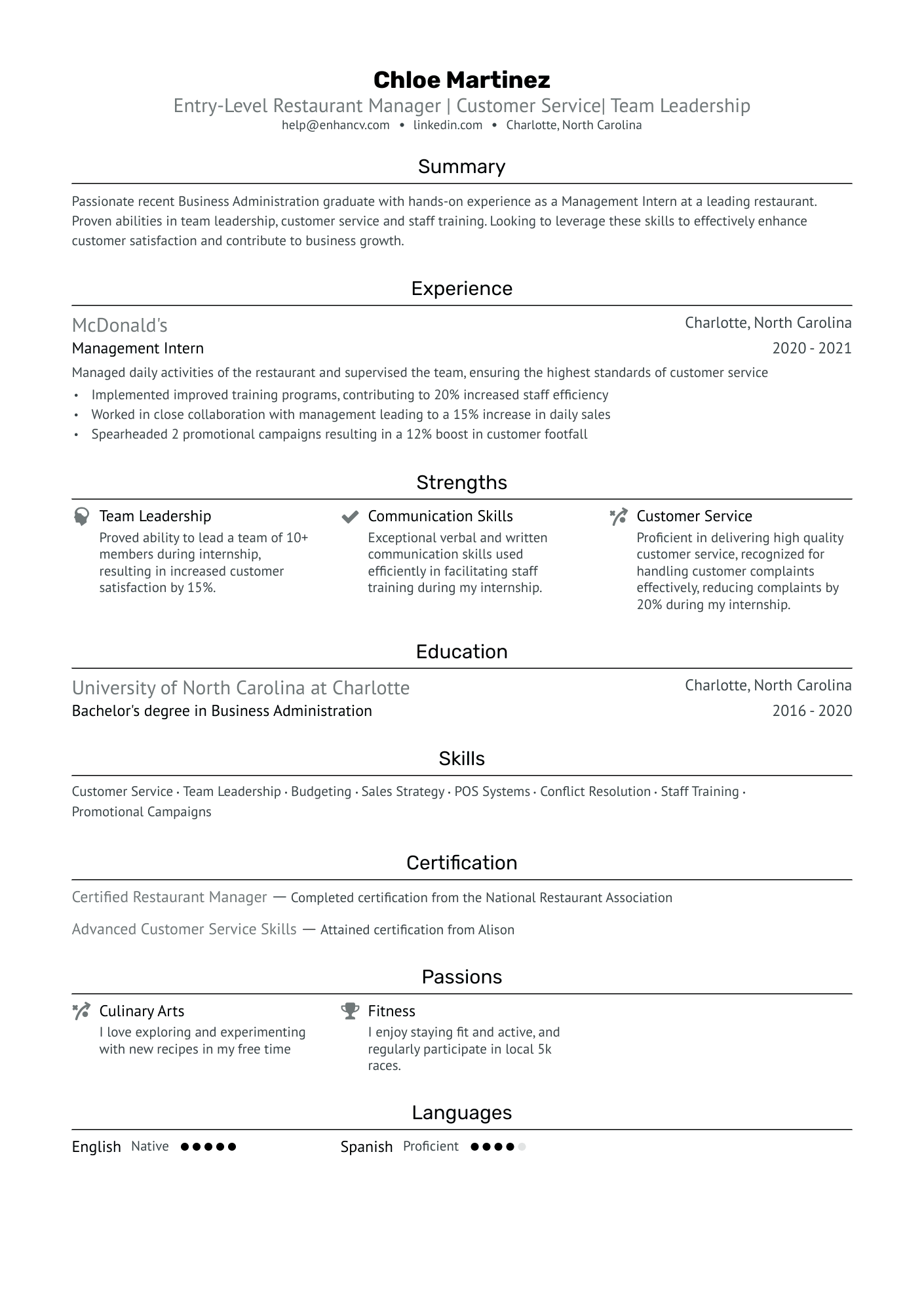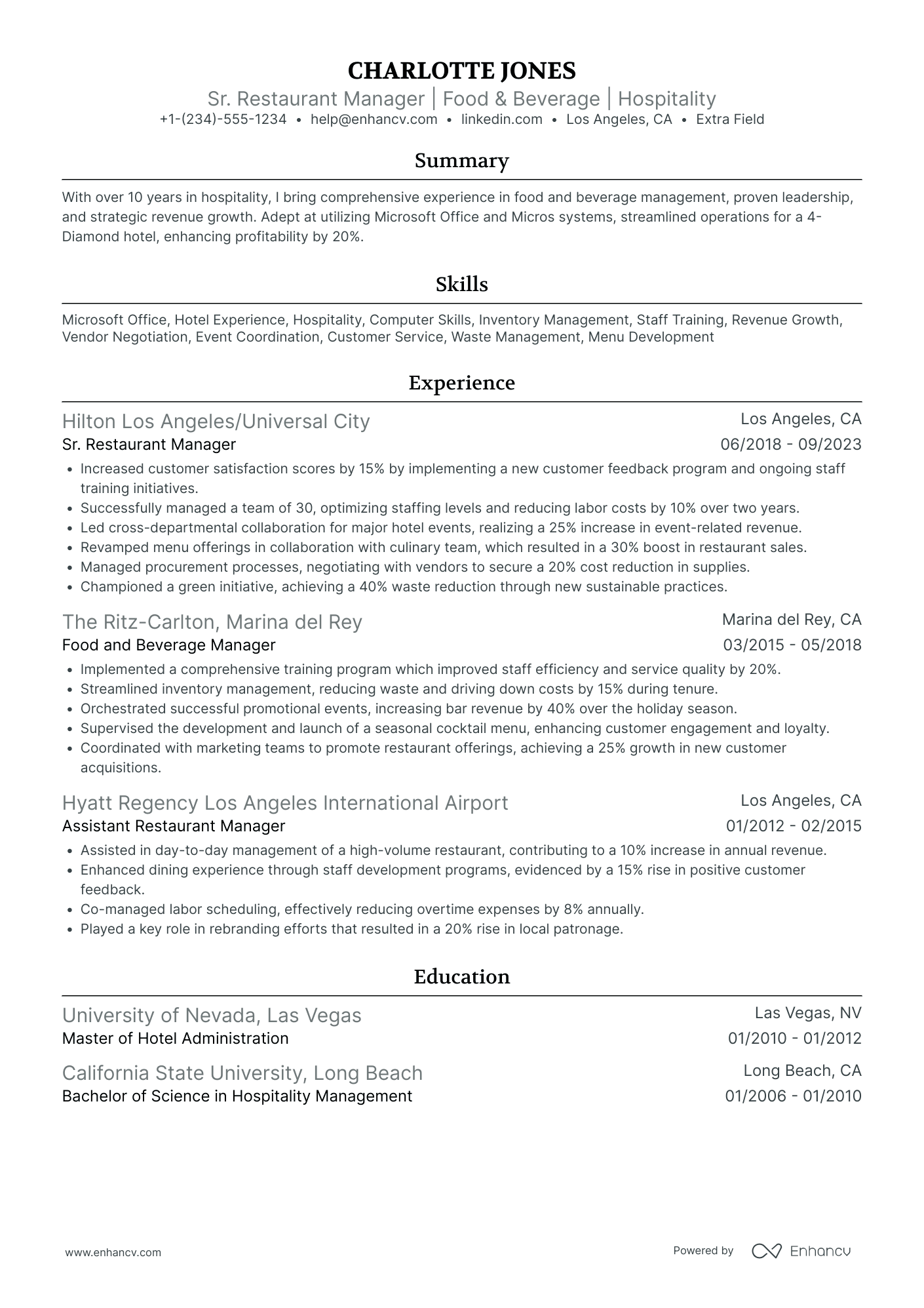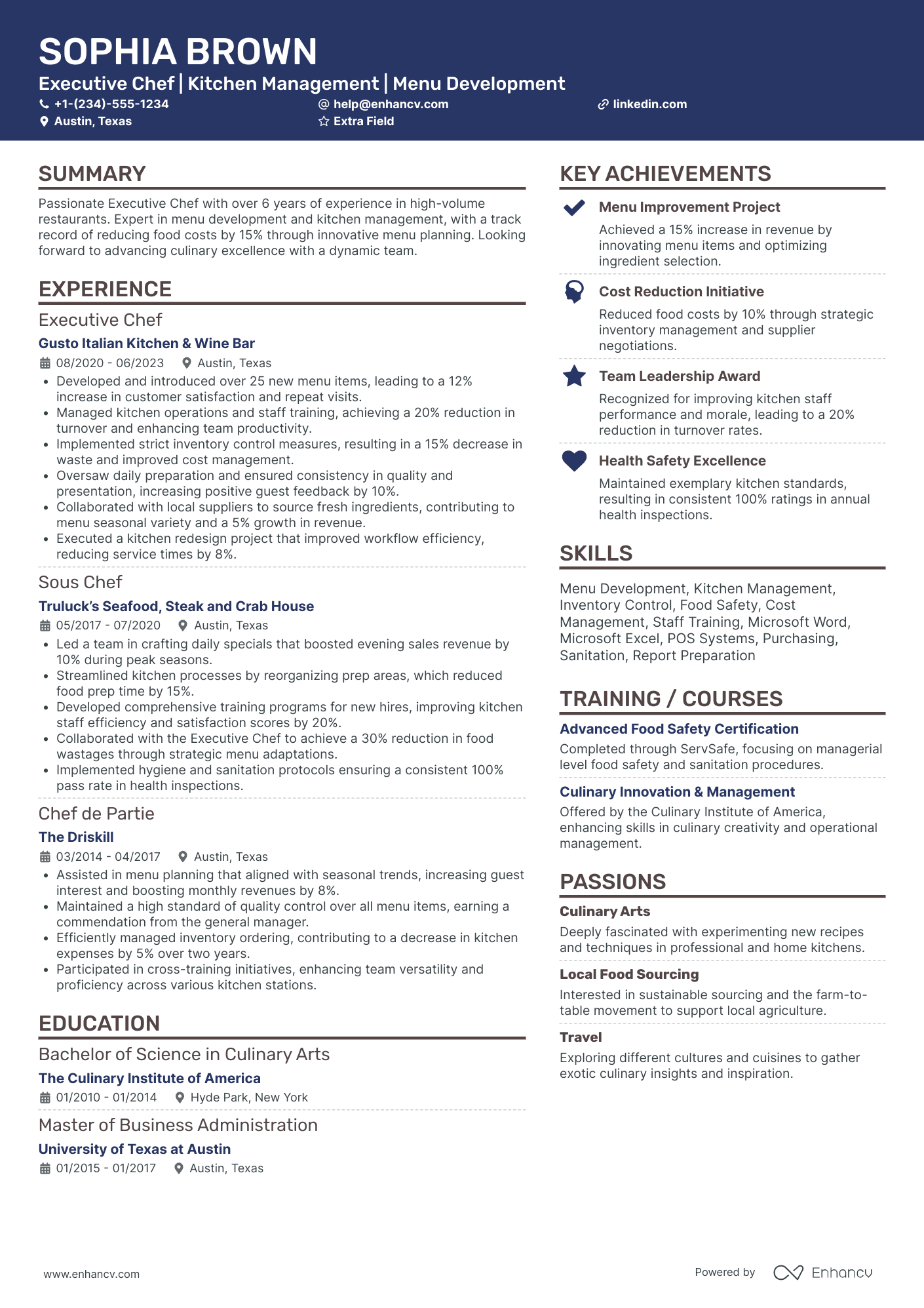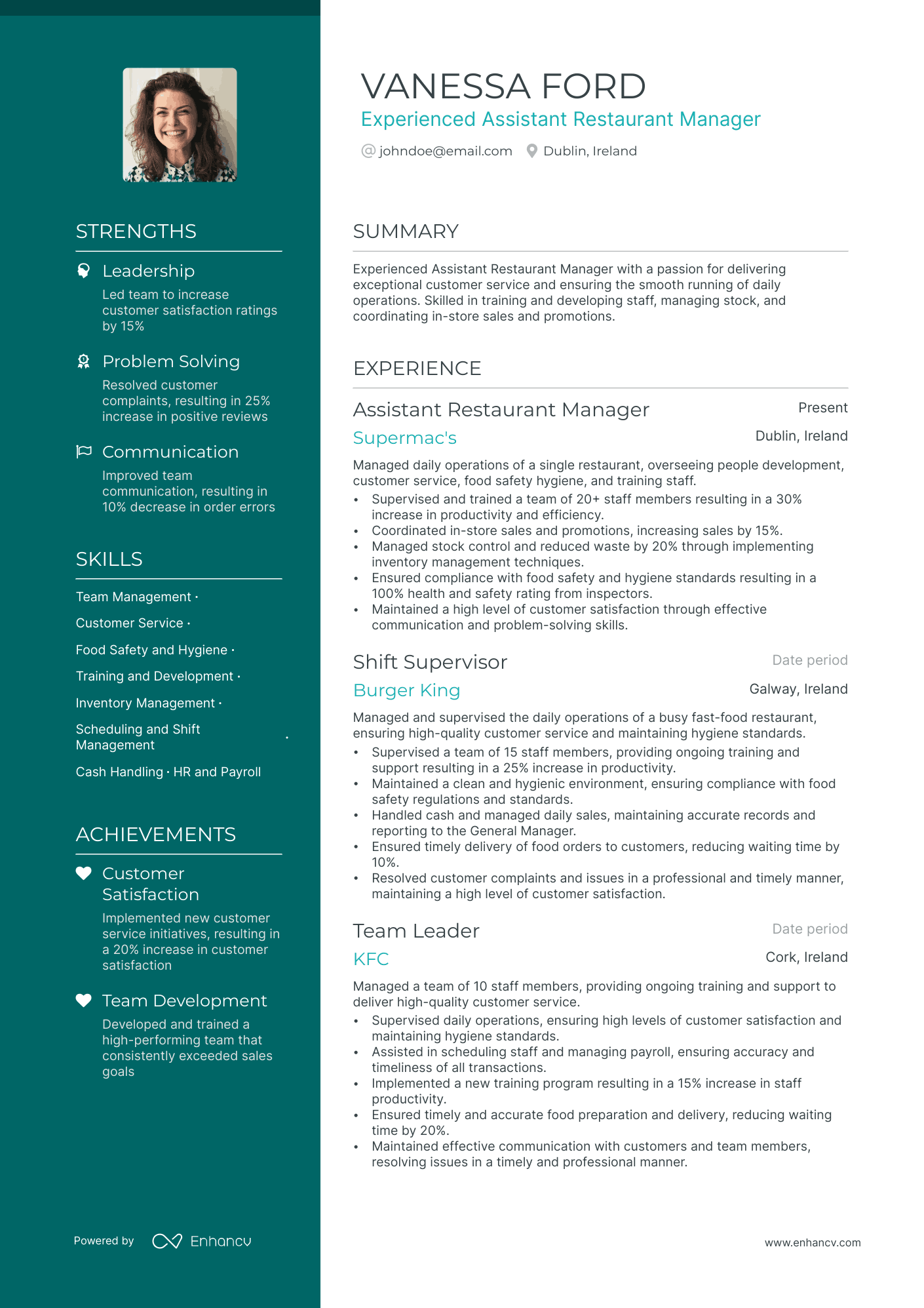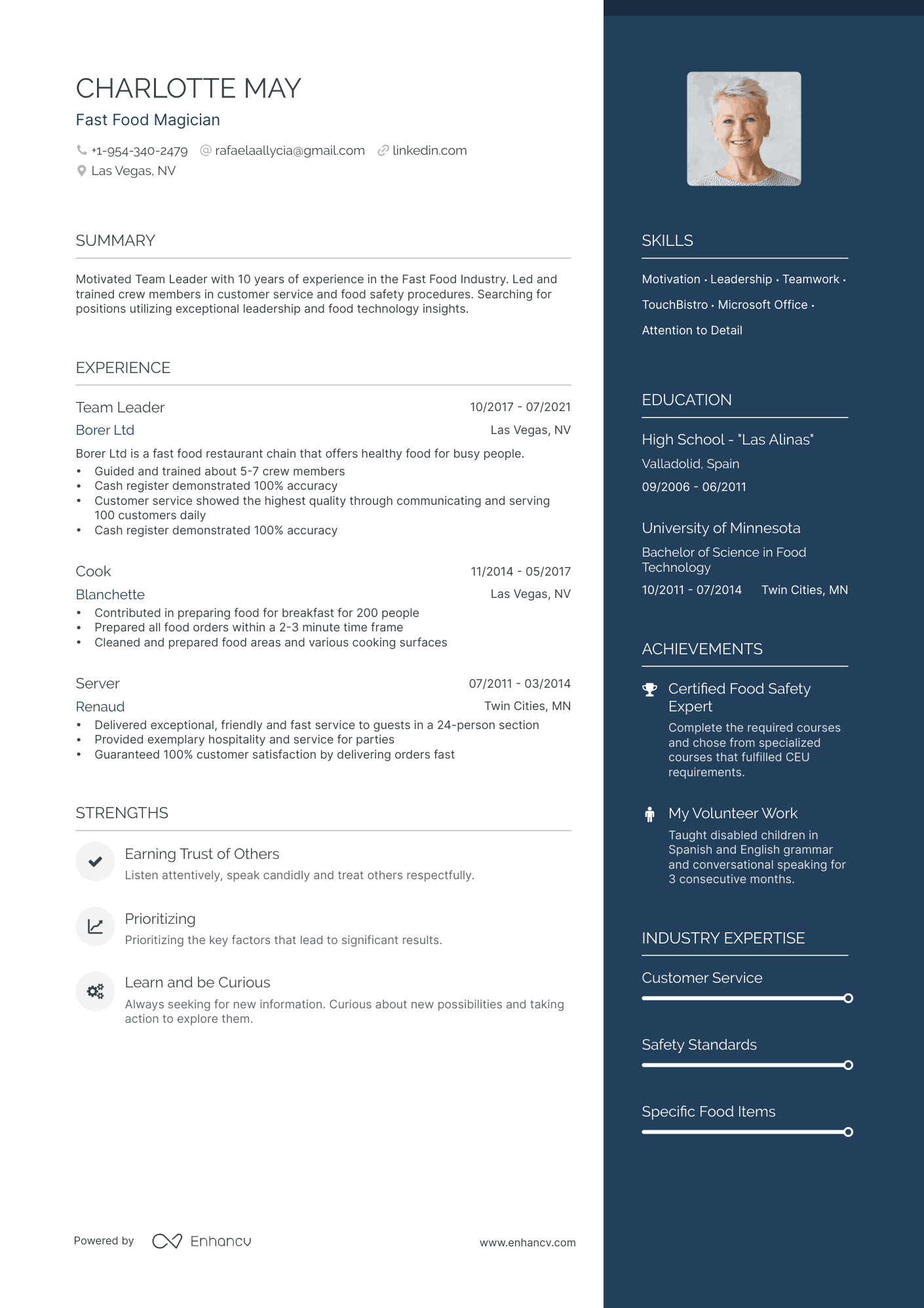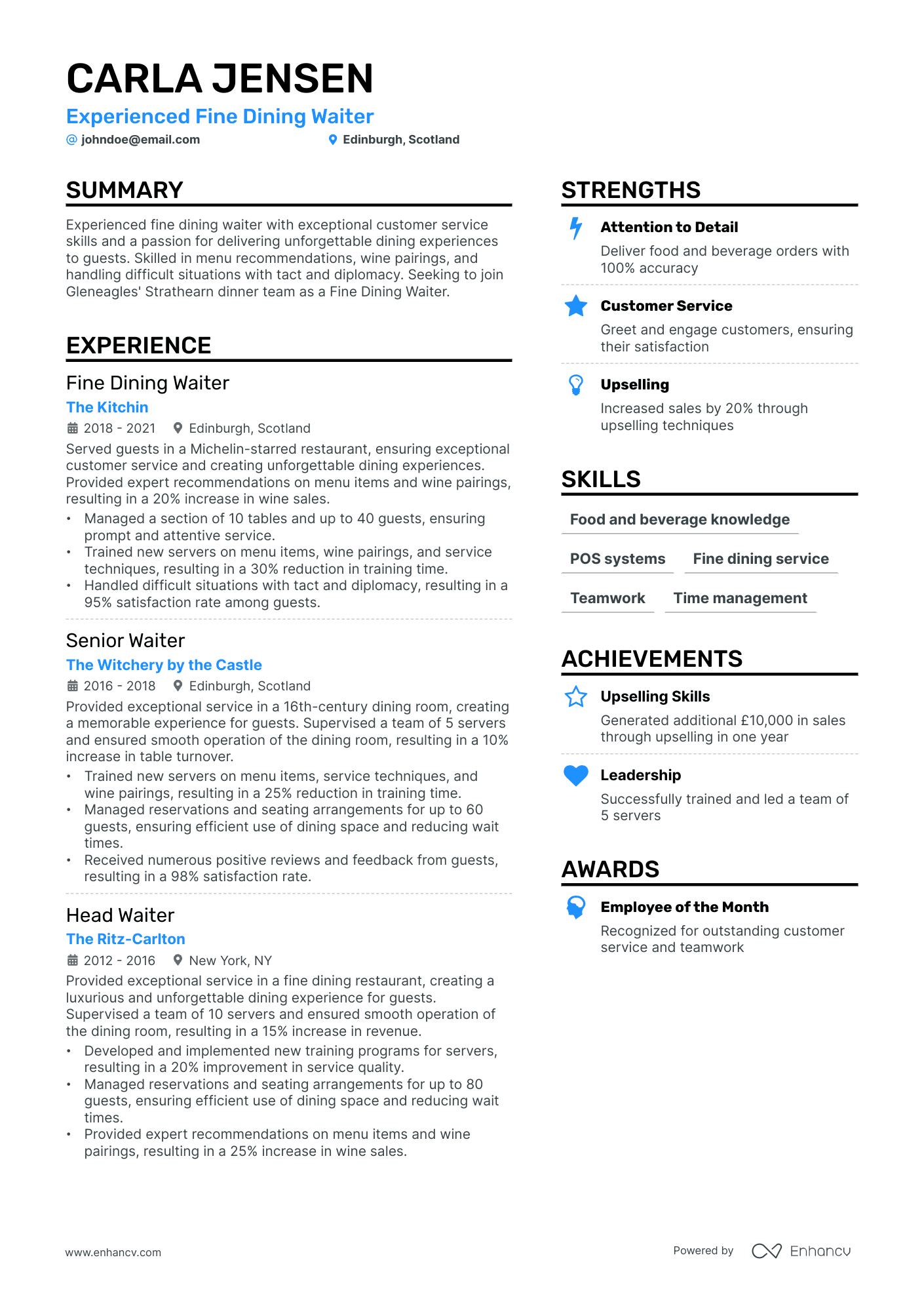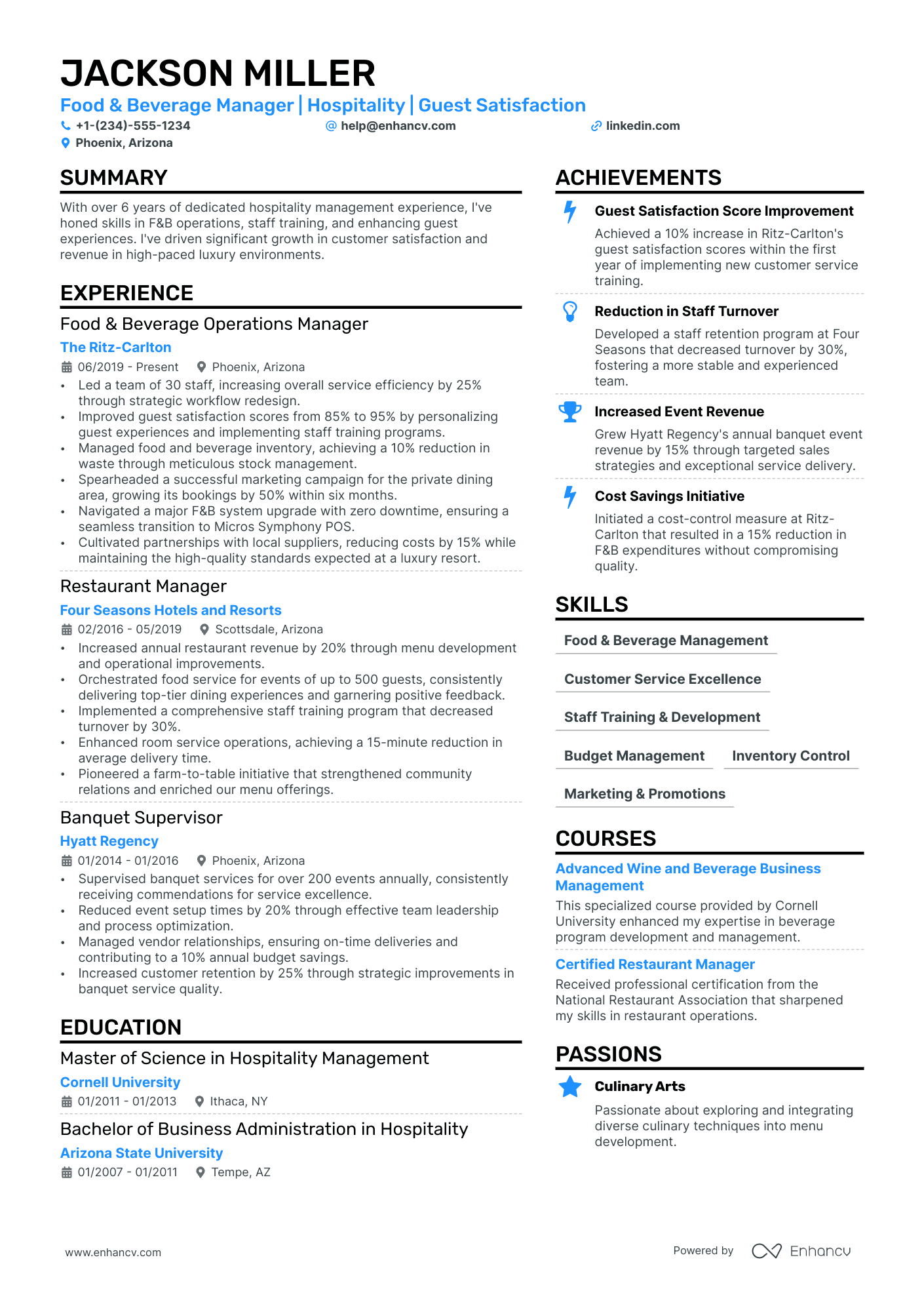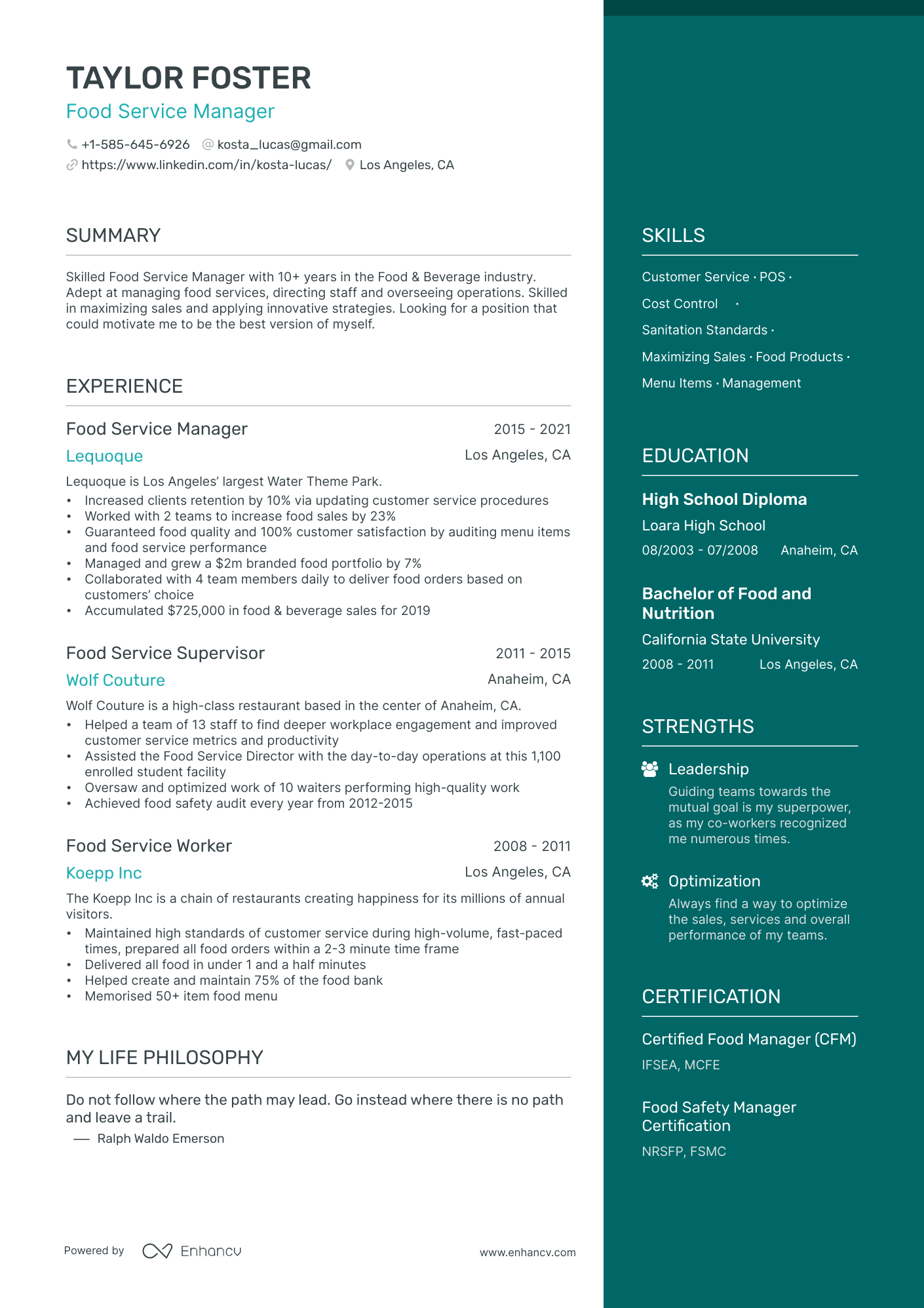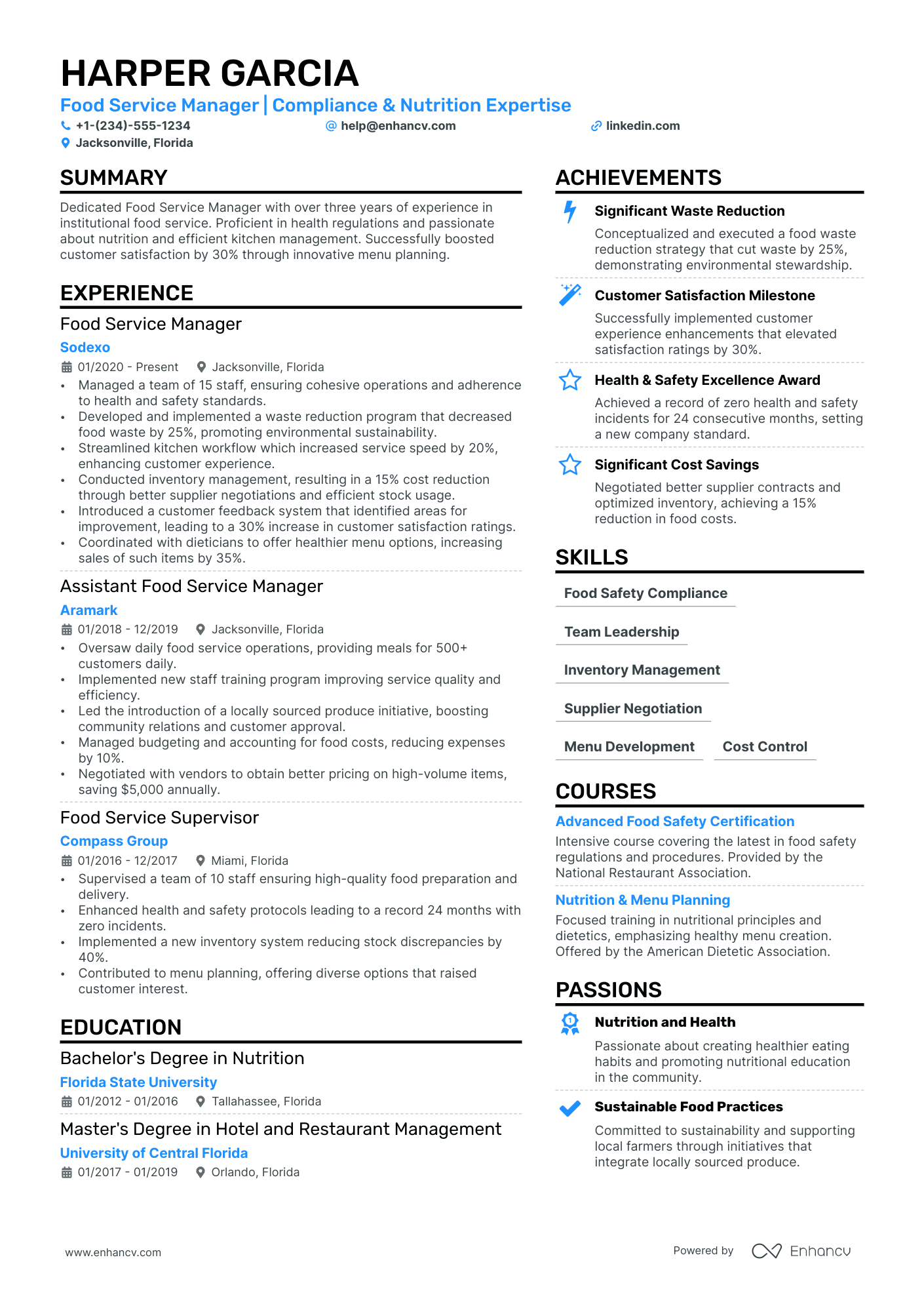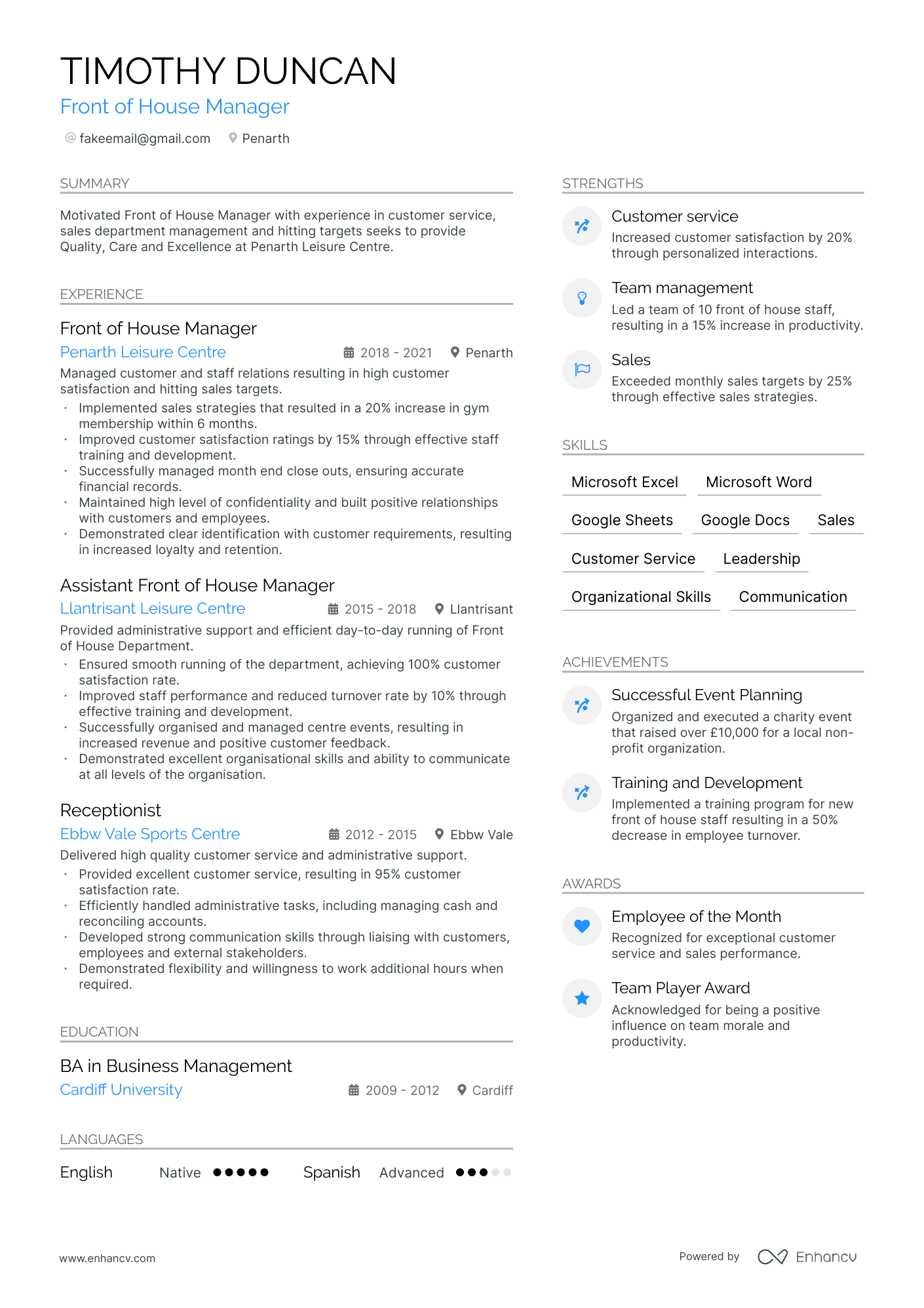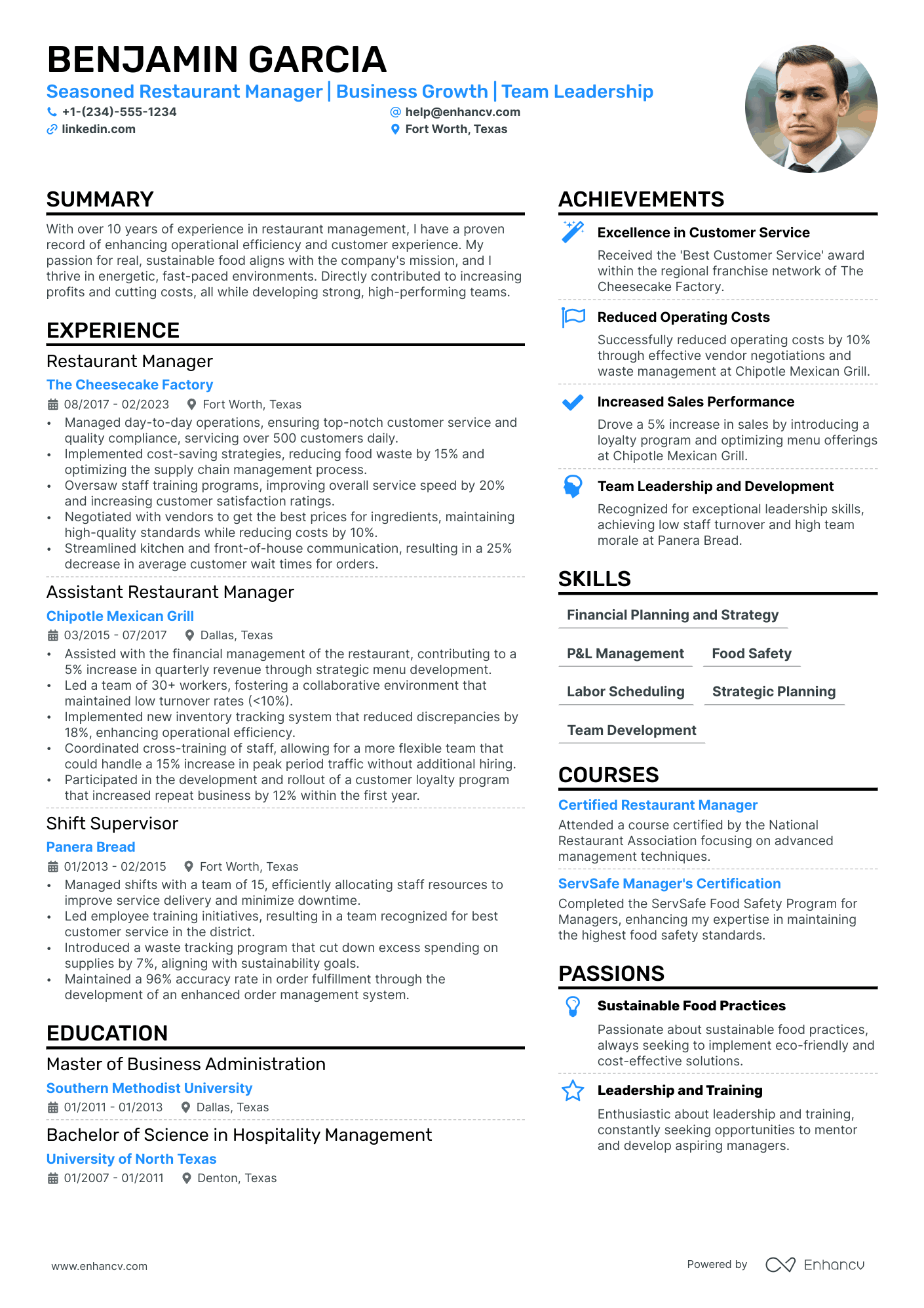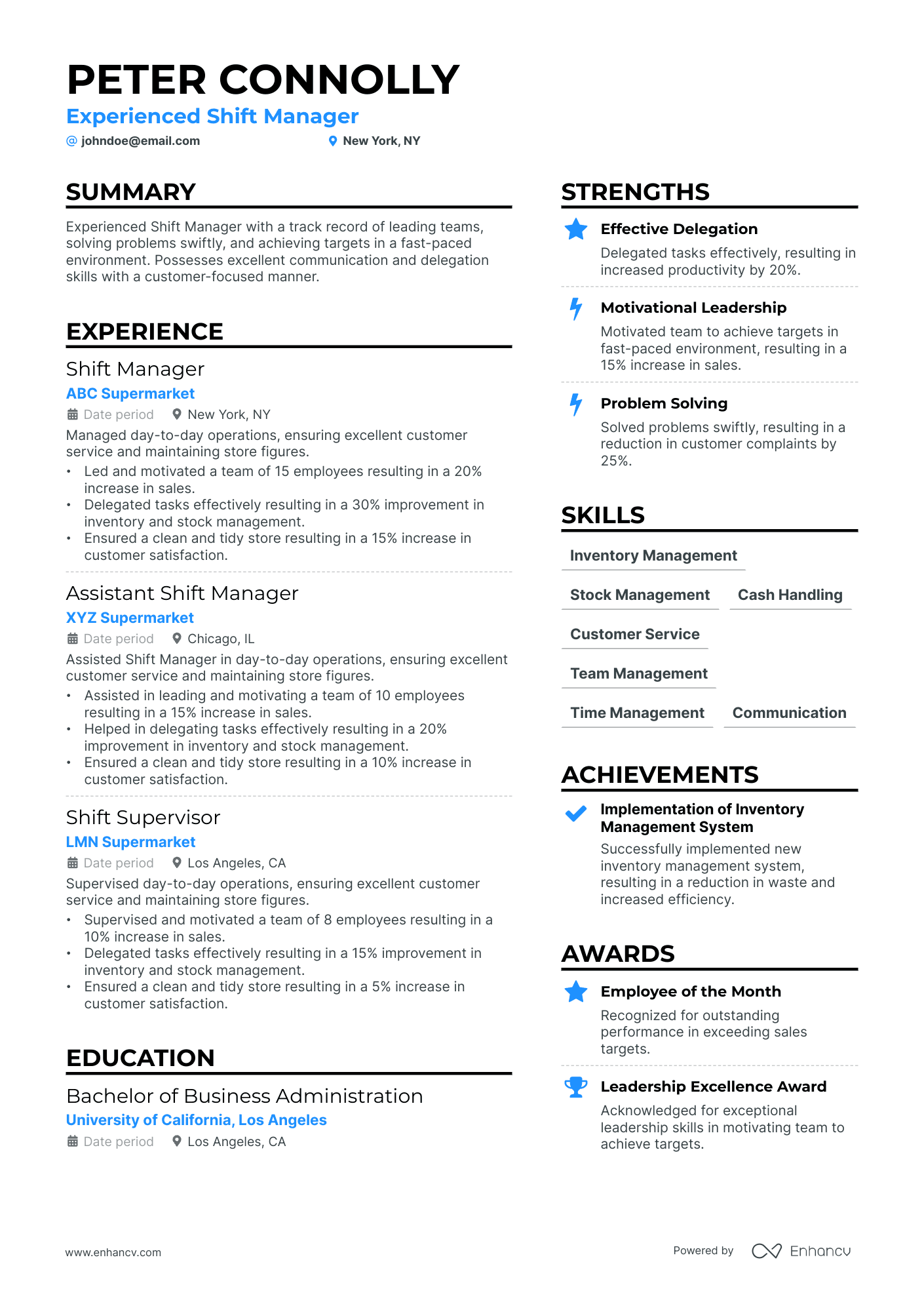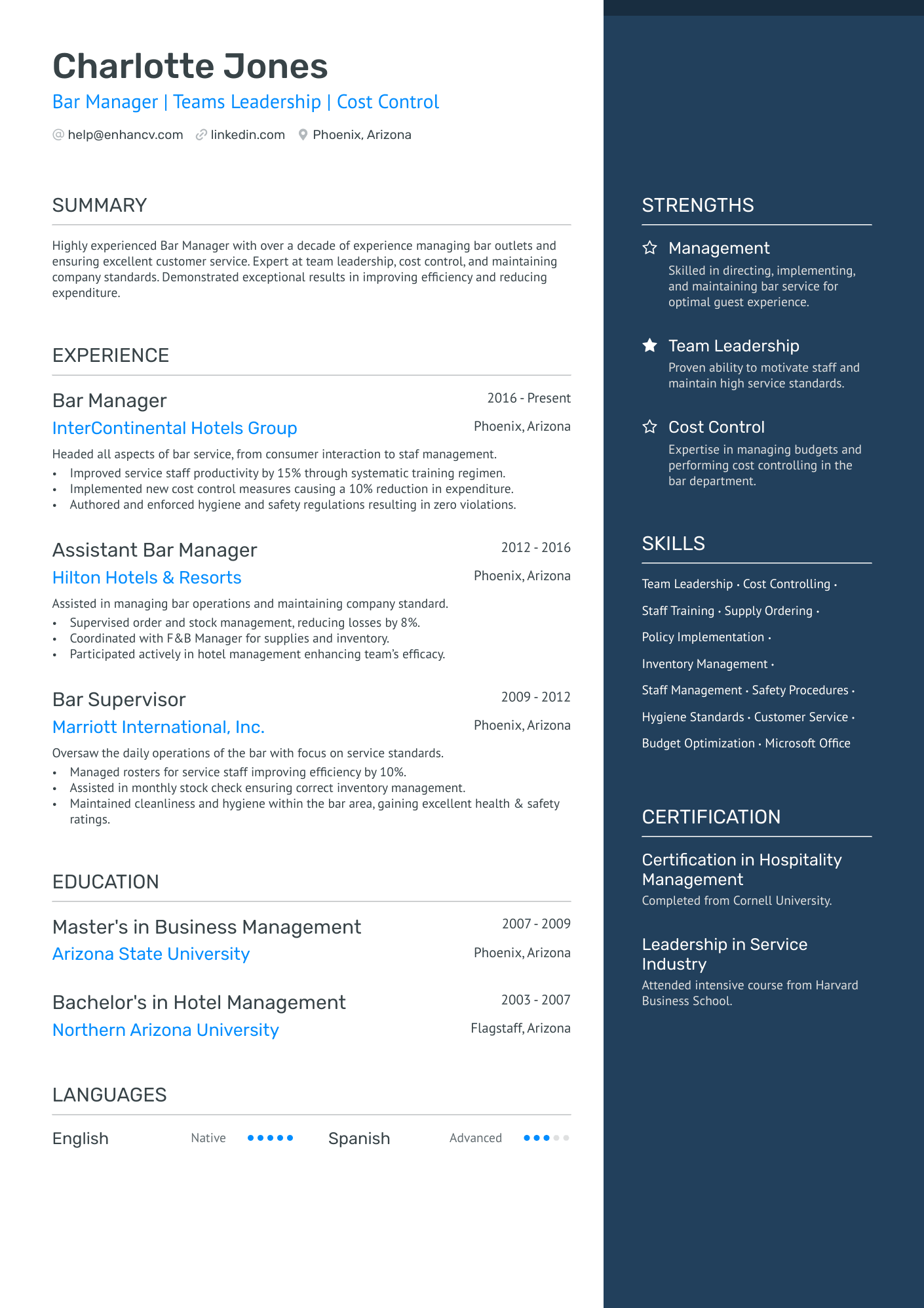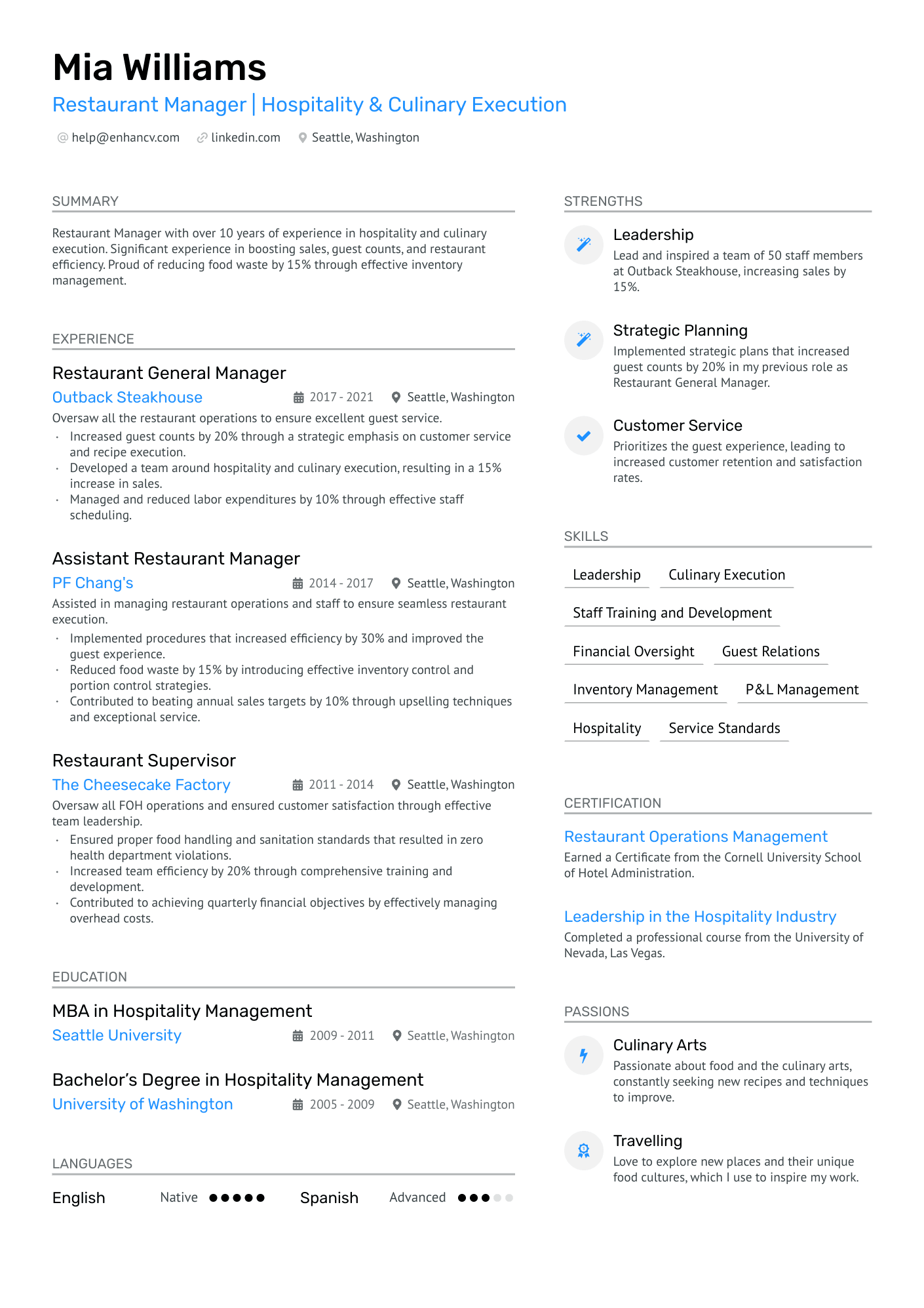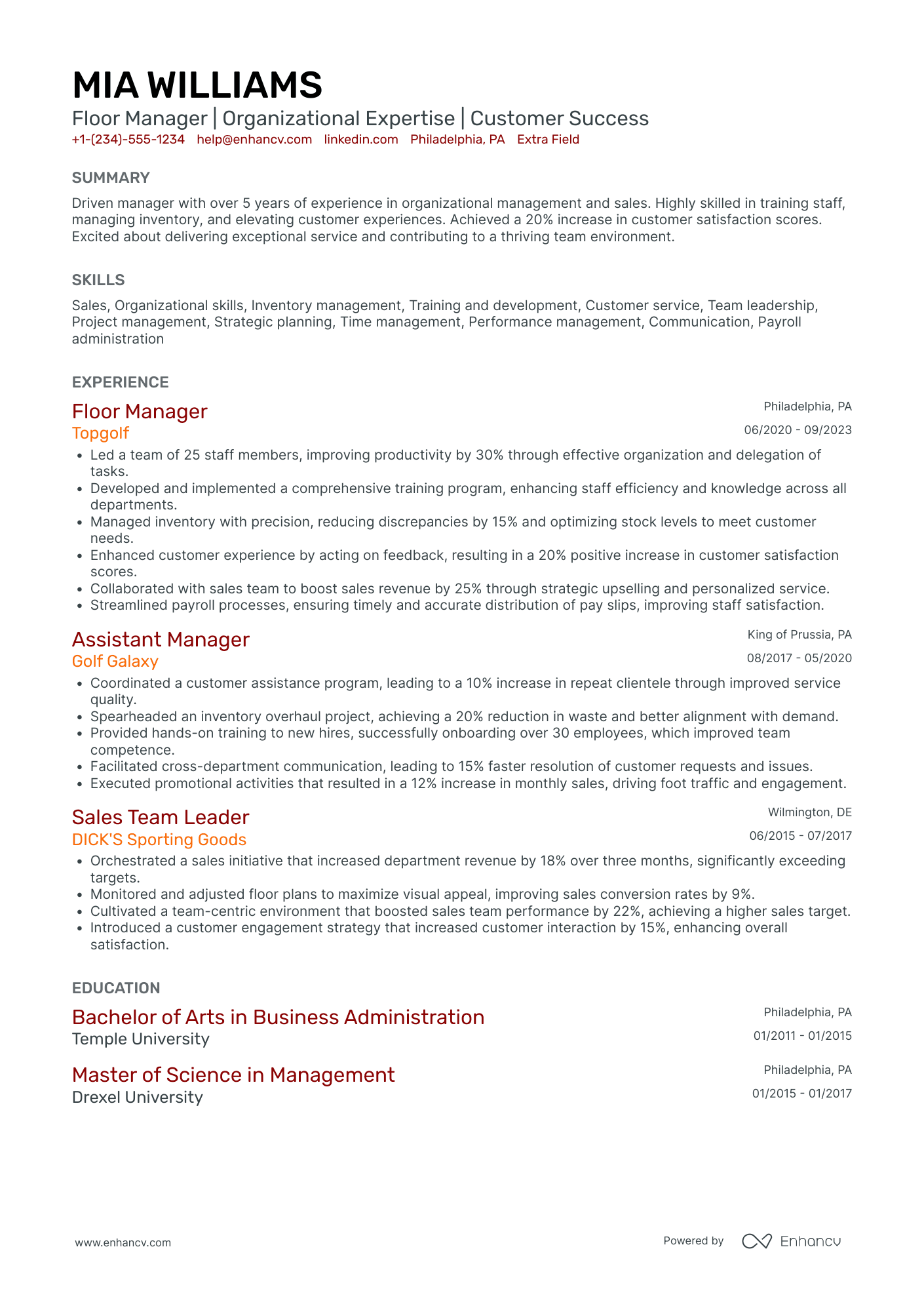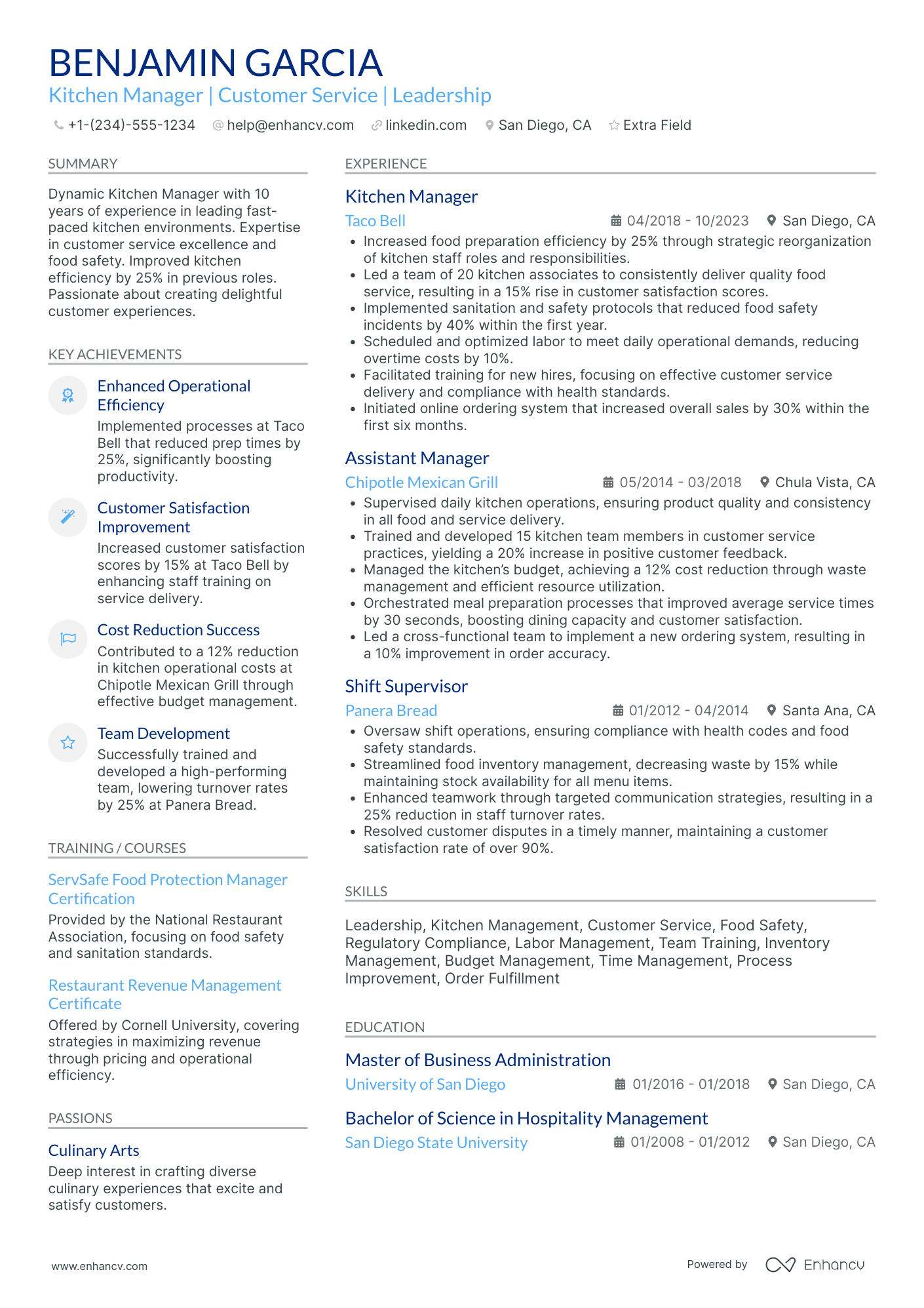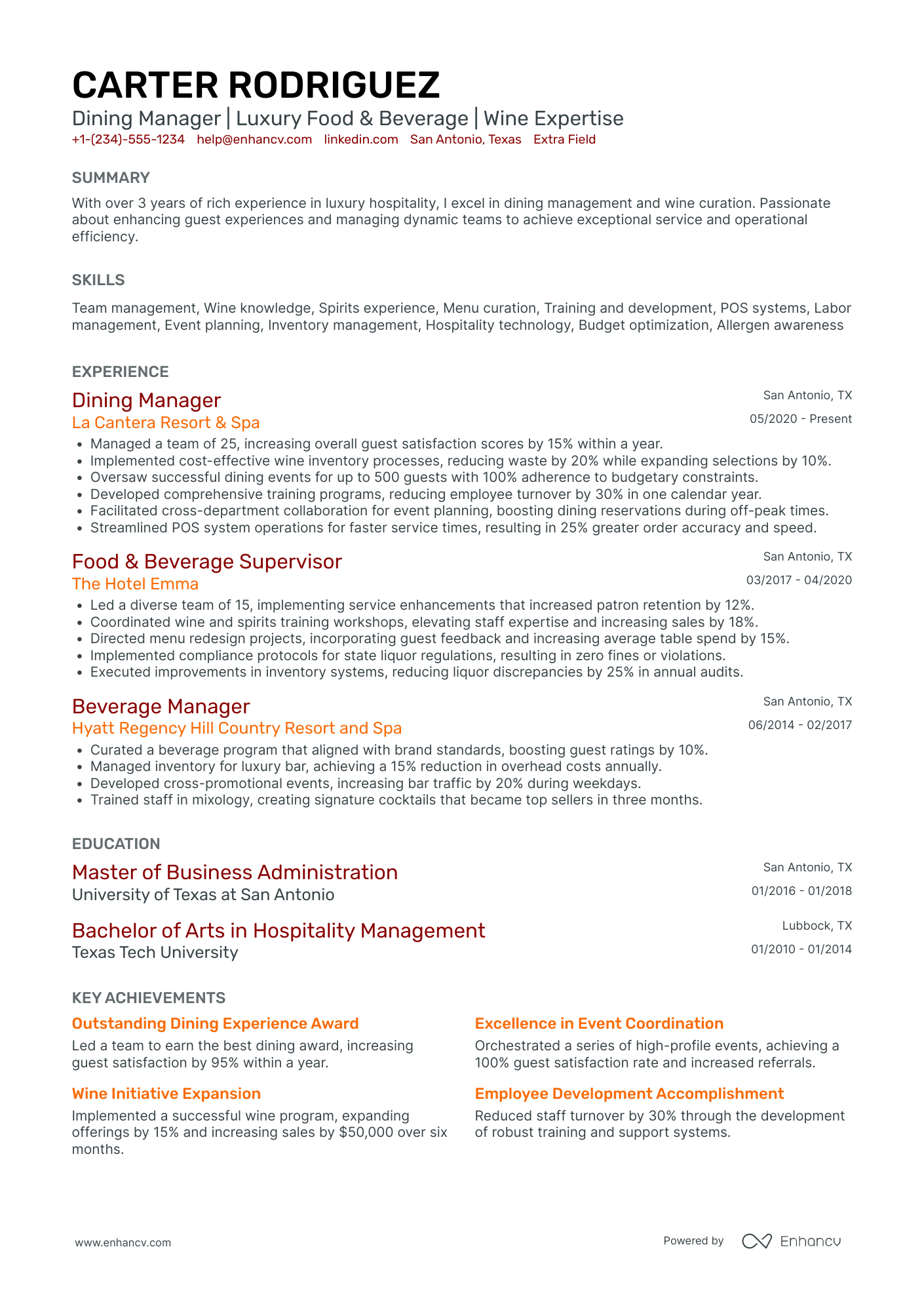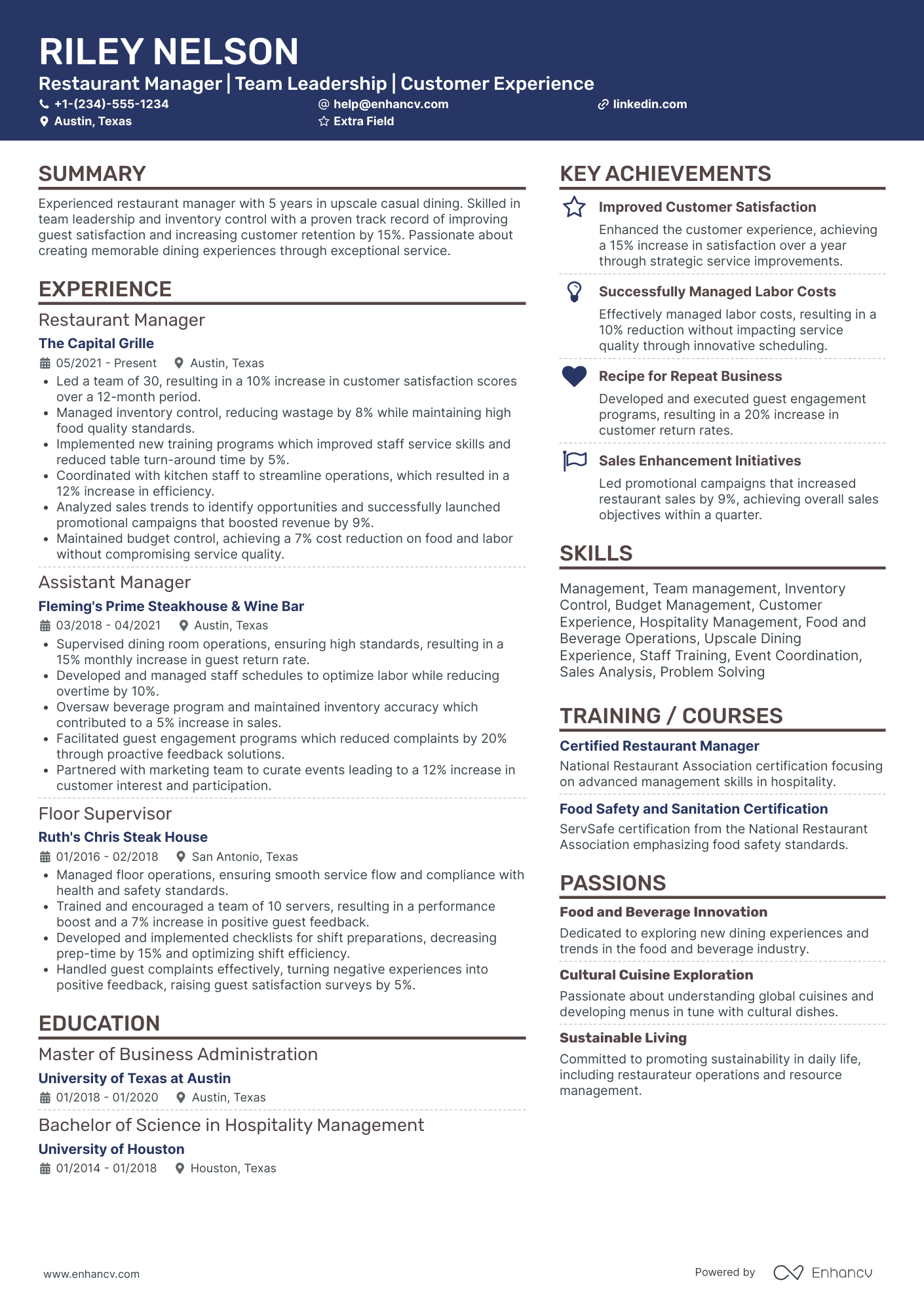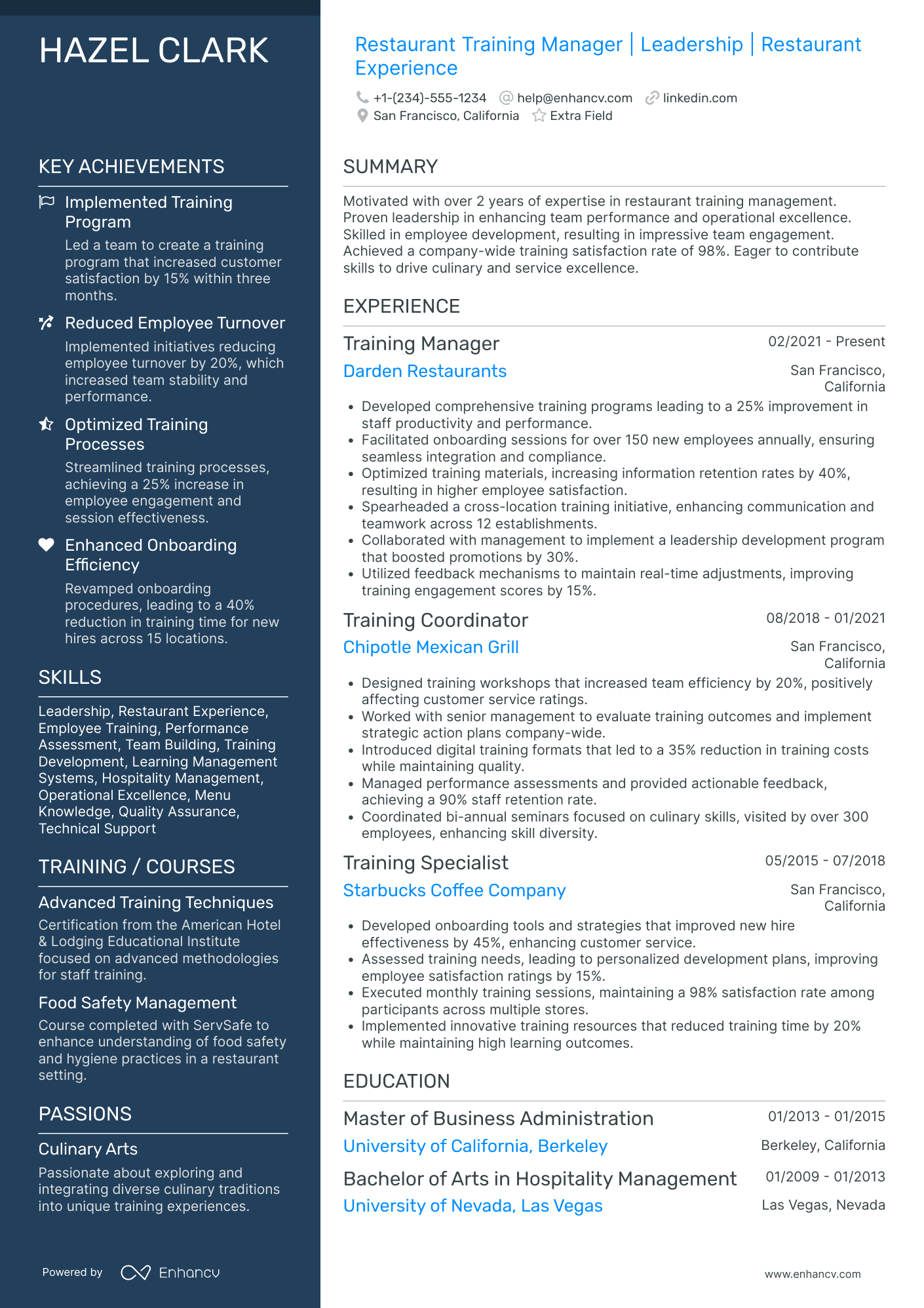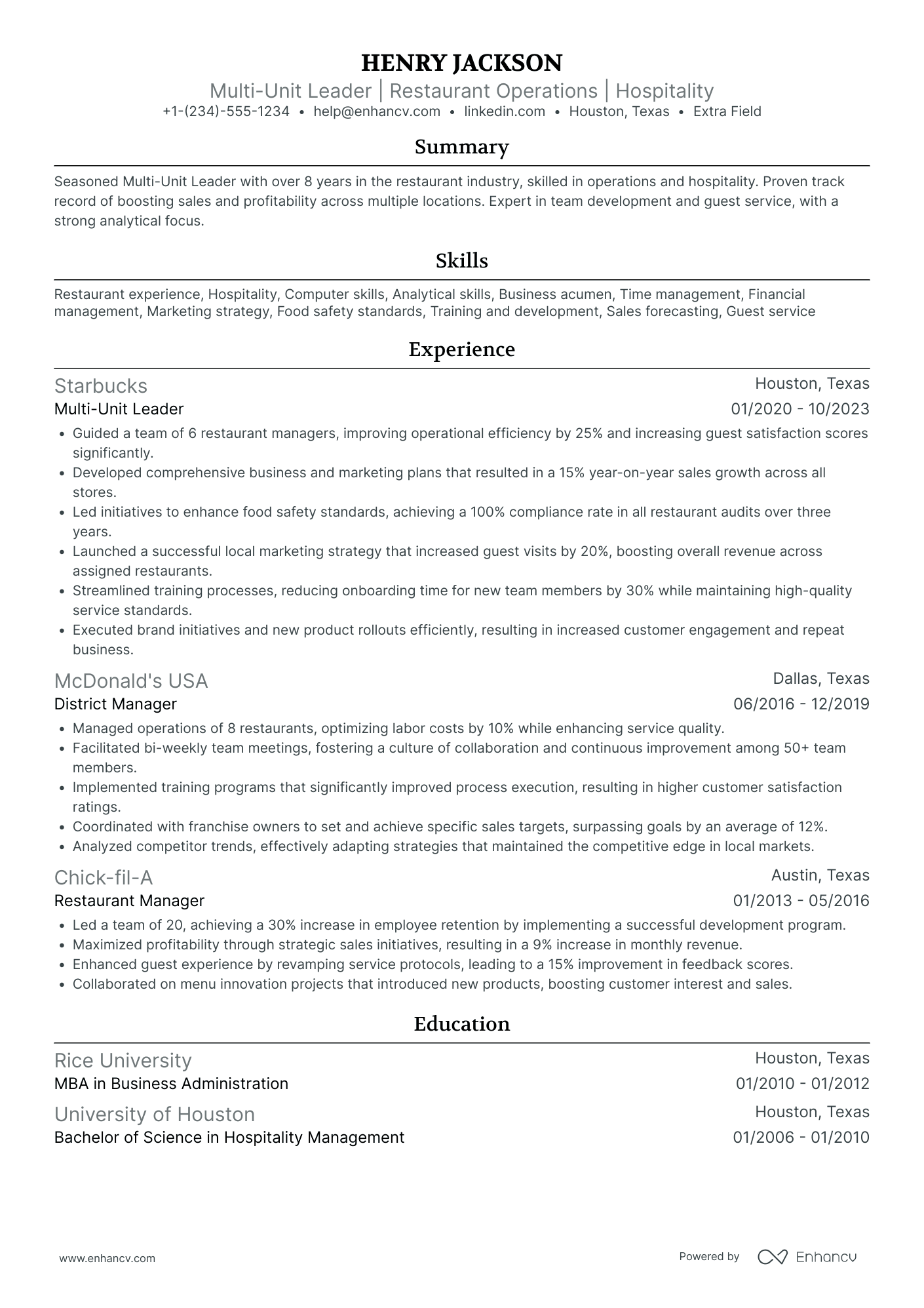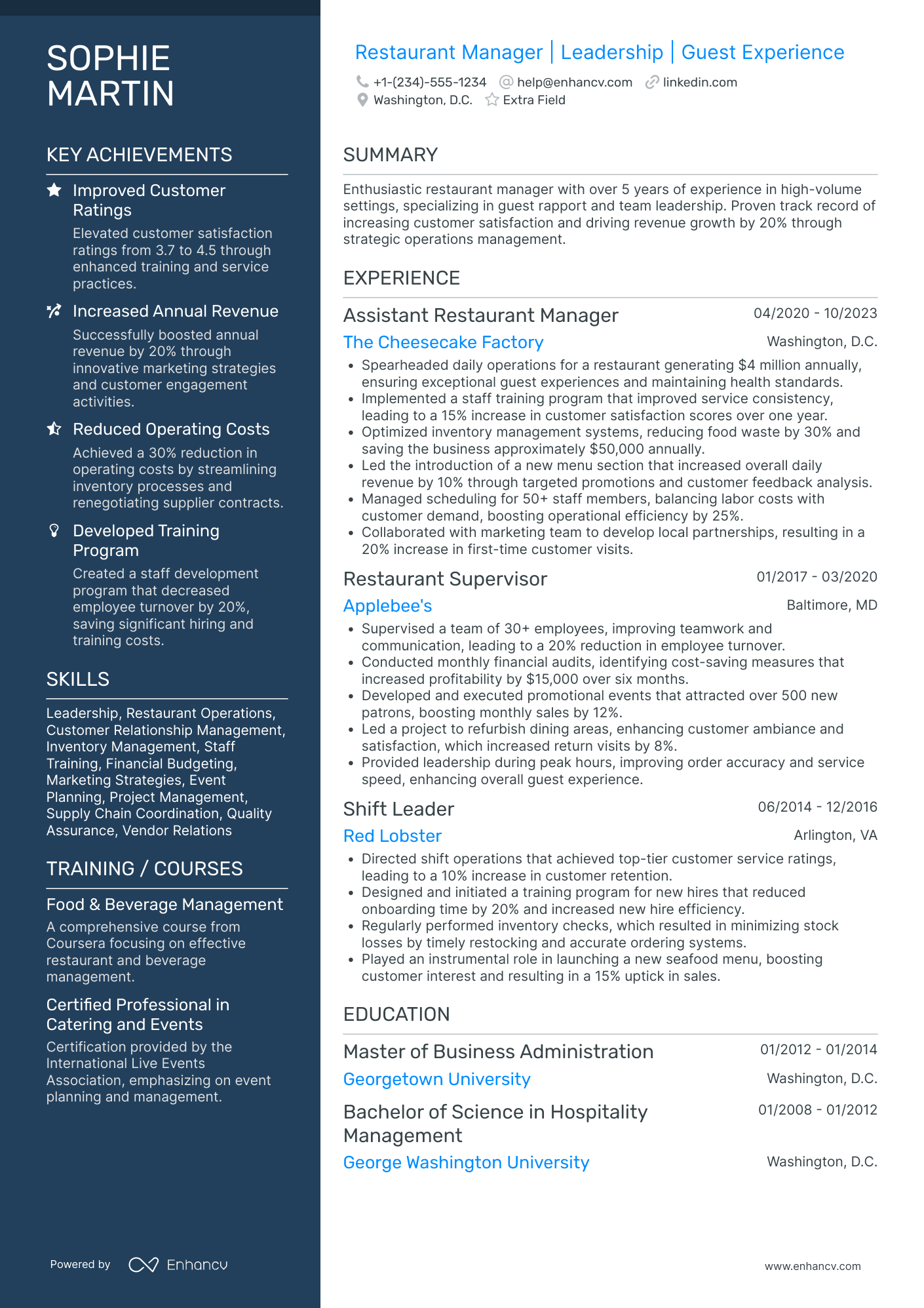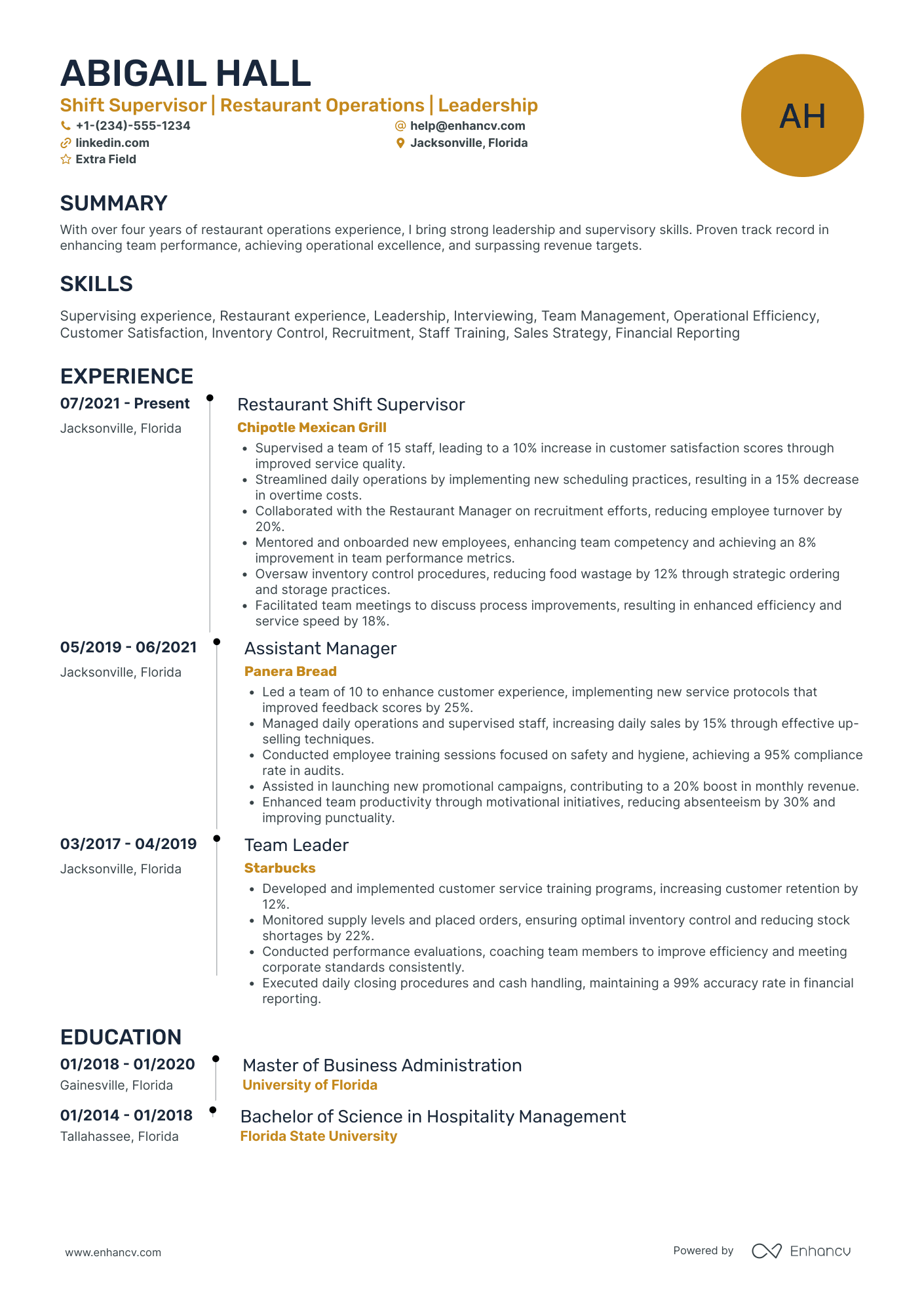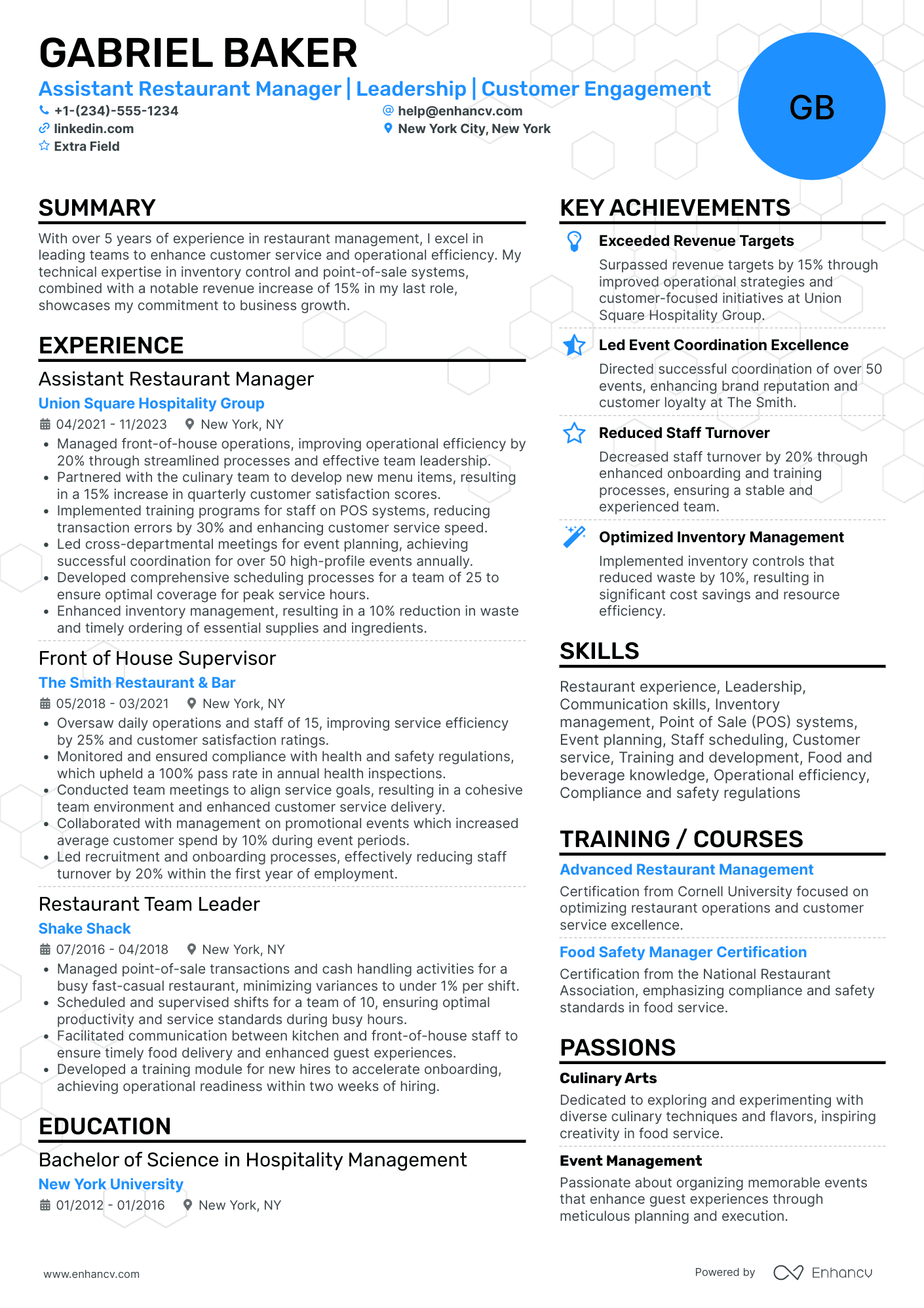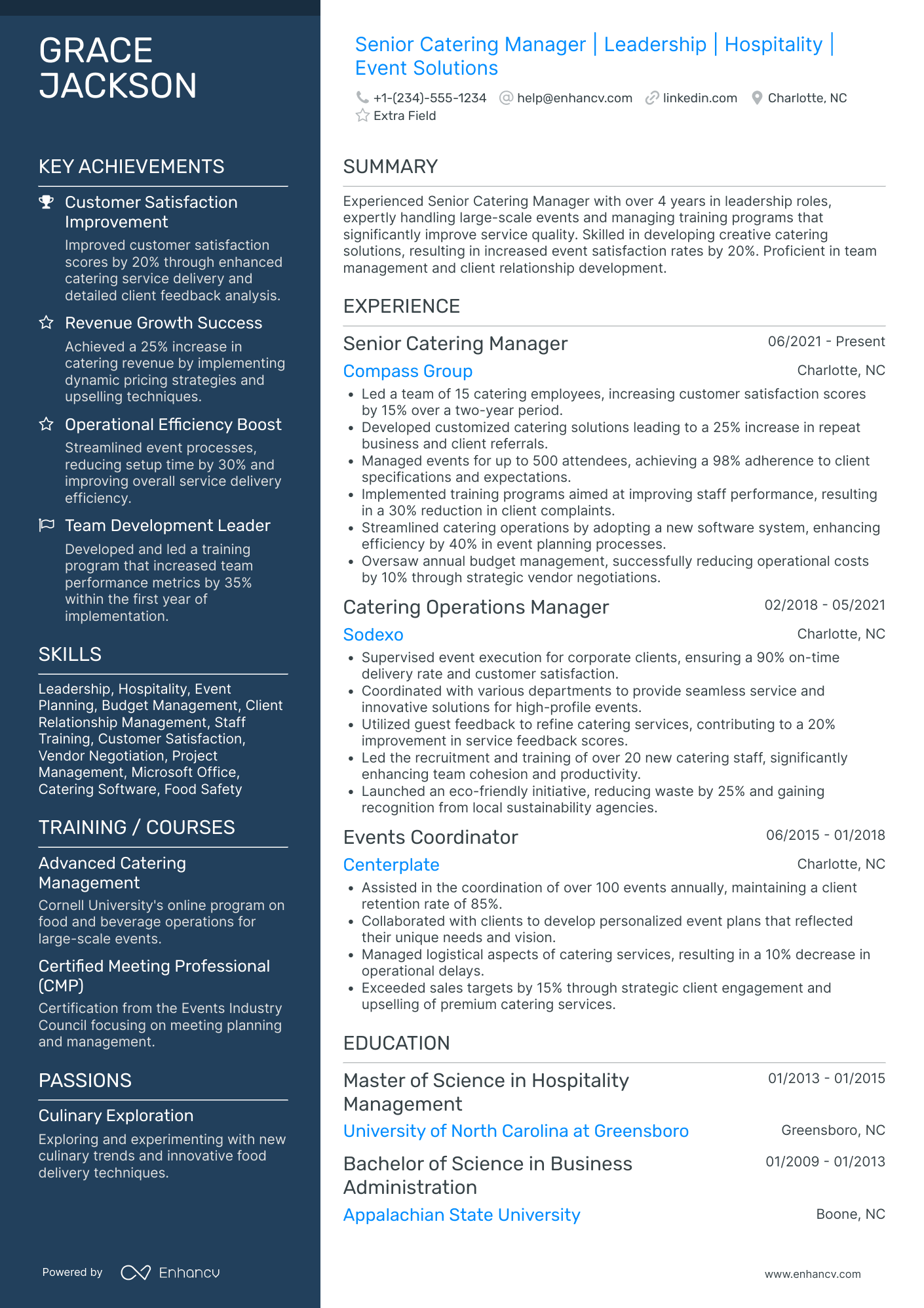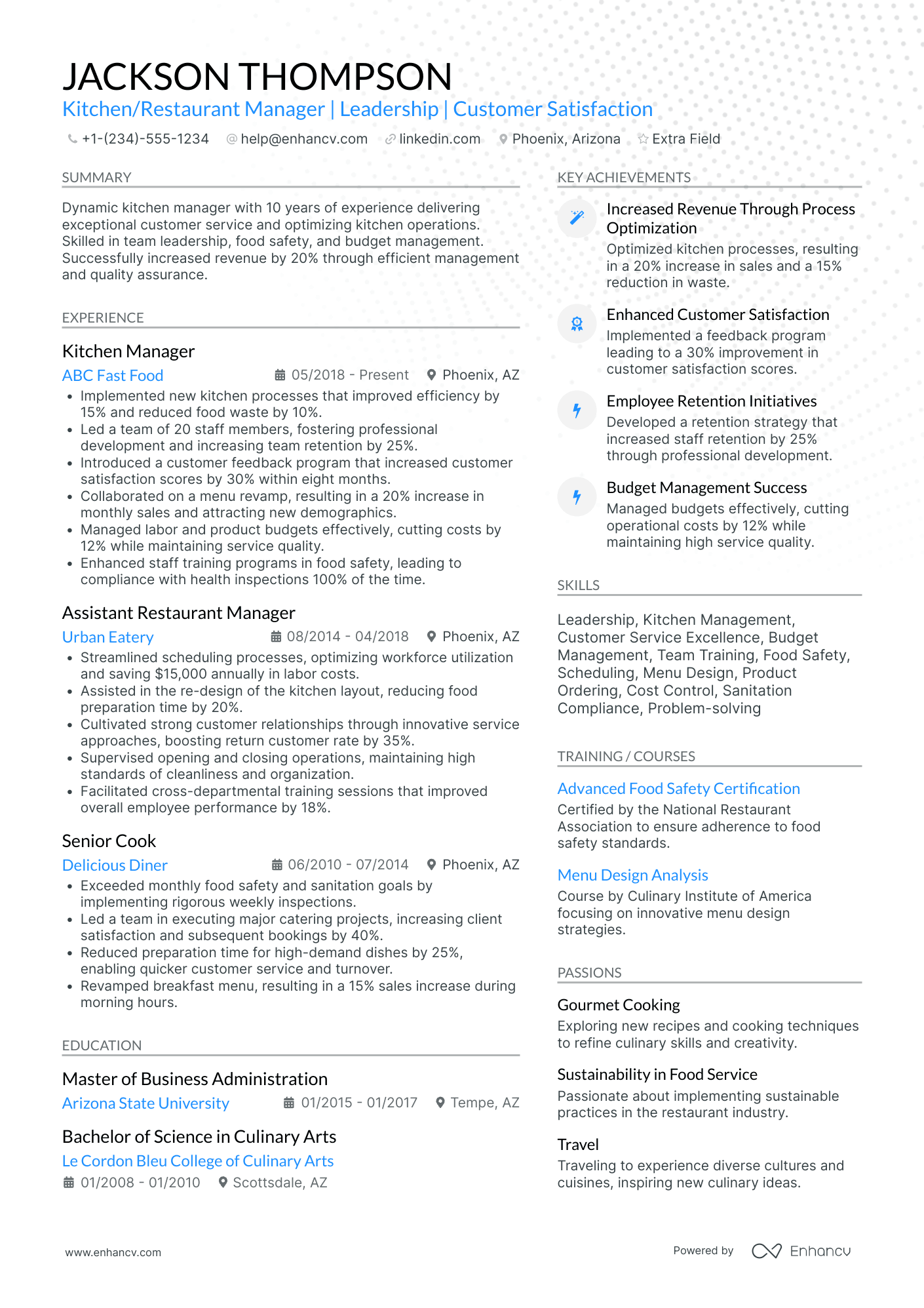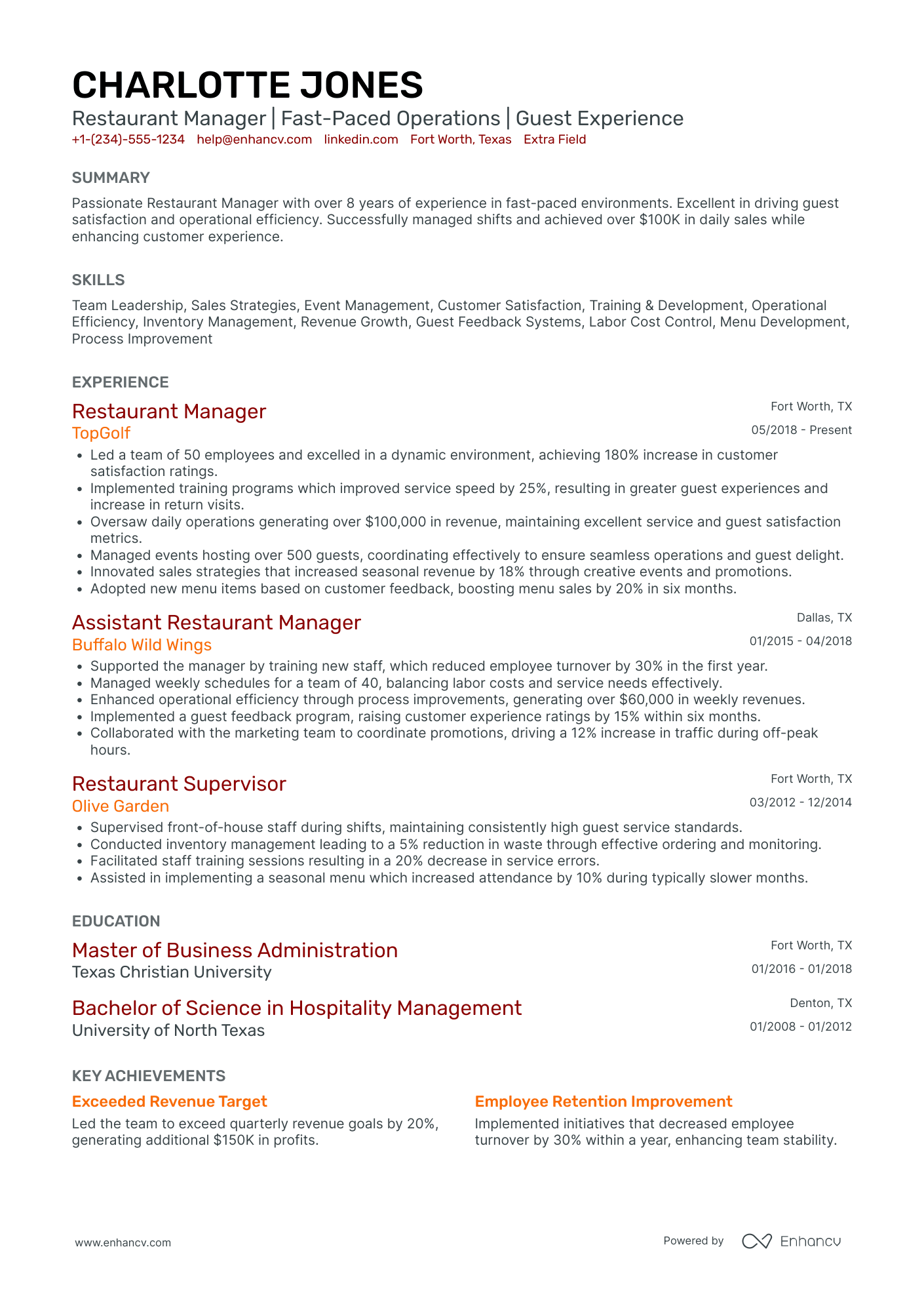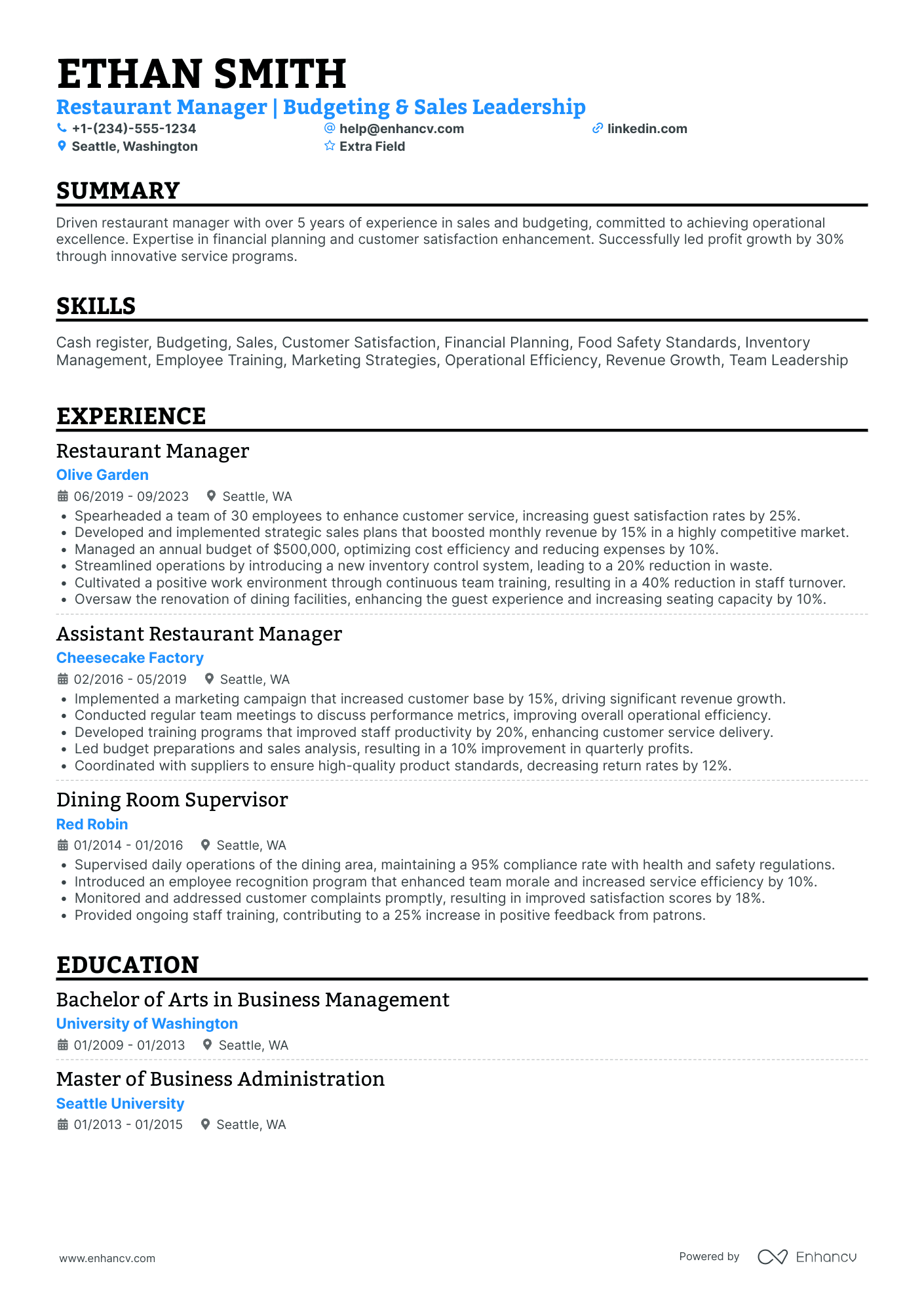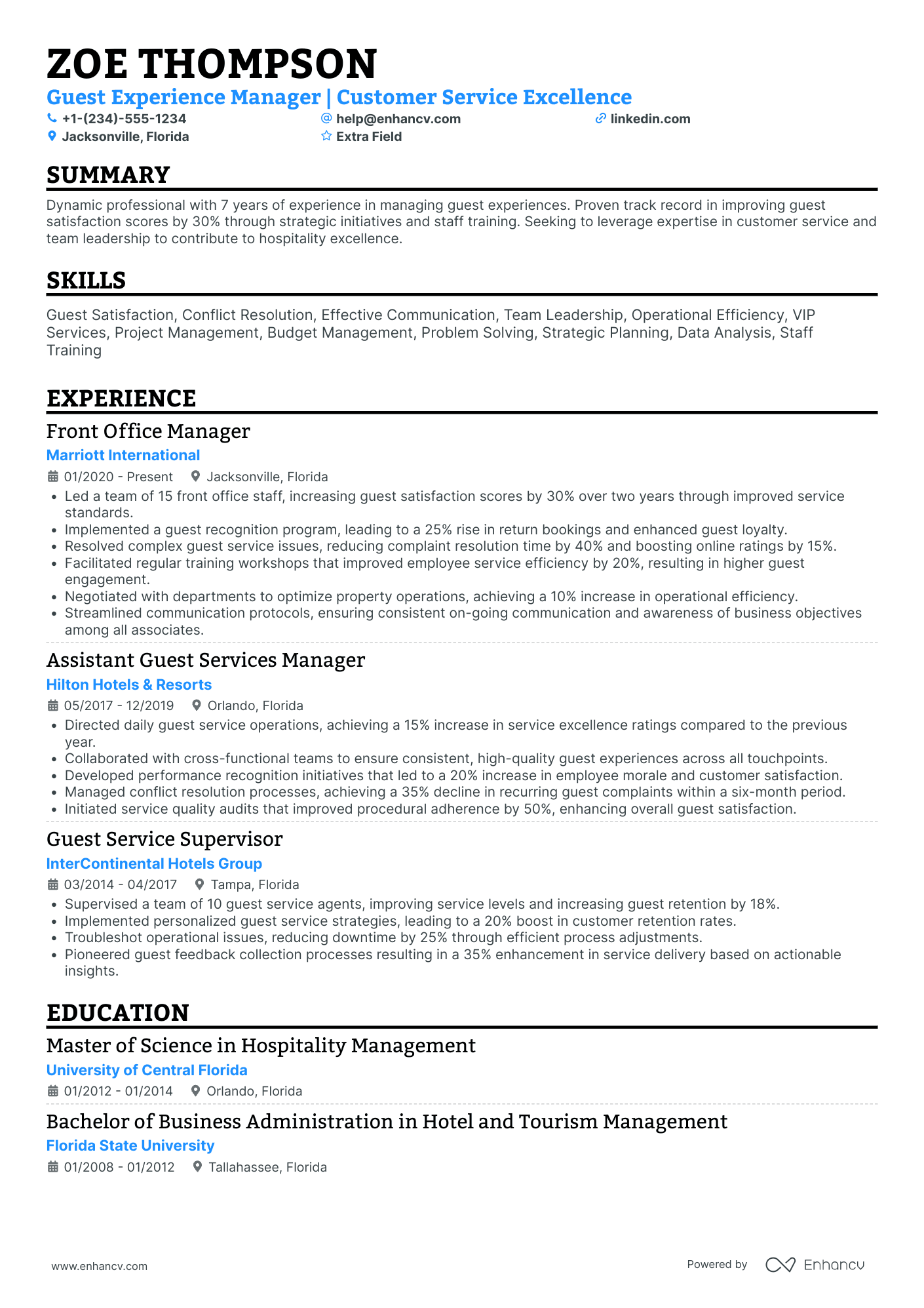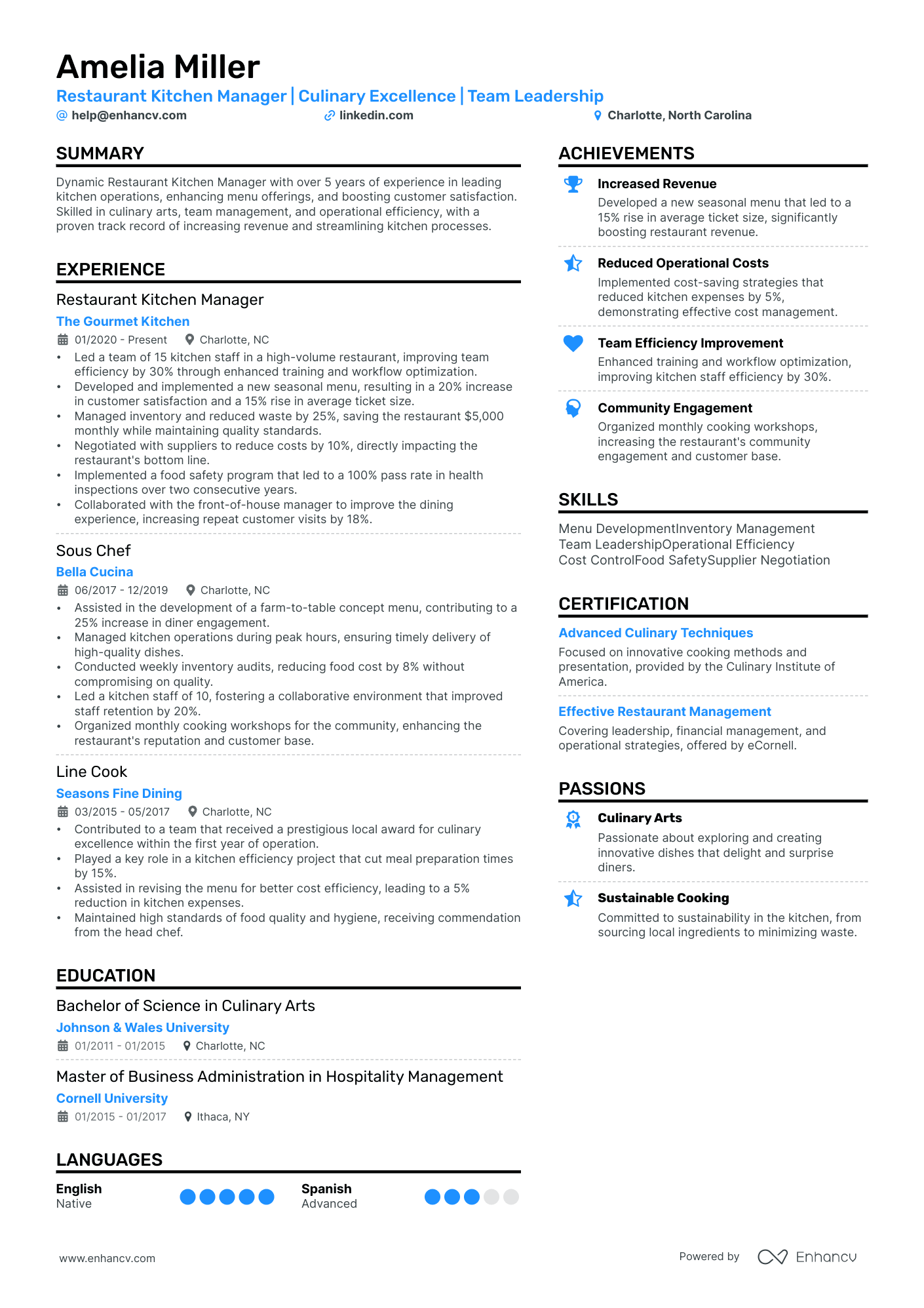It’s 2026 and time for a new job! So knowing how to write a resume has become more relevant than ever. Managerial skills, paramount across all industries, are particularly important in the food sector where restaurant managers face unique challenges, such as getting over cultural barriers, high turnover rates, or just the constant unpredictability.
Given the industry's specificity, restaurant managers must possess a broad skill set to effectively handle diverse clientele as well as employees from diverse backgrounds. Despite the demanding nature of the role, many remain passionate about their work. It’s about forming personal connections with clients and finding joy in combining people management with food service.
You may be asking yourself what’s the purpose of a resume - this guide will cover every aspect of crafting an ideal restaurant manager resume example, so take a deep breath.
Maybe you already have a resume? Let’s see how it rates, just upload it to Enhancv’s Resume Checker to find out.
Looking to apply for another position in the hospitality sector? Discover some other related resumes:
Restaurant Manager resume Example
Let’s have a glance at a well-written restaurant manager resume.
Here’s what the applicant does well in their resume:
- Demonstrates a good deal of leadership and management skills by highlighting their role in improving team efficiency and developing new menu items. These critical skills directly contribute to increased customer satisfaction and revenue.
- Showcases a strong educational background with a Bachelor of Science in Culinary Arts and an MBA in Hospitality Management, emphasizing their well-rounded expertise in both culinary and business aspects of restaurant management.
- Lists concrete achievements and certifications, such as developing a seasonal menu that increased average ticket size and obtaining certifications in Advanced Culinary Techniques and Effective Restaurant Management, spotlighting their commitment to development and excellence in the culinary field.
Now that you know what a restaurant manager’s resume should look like, let’s move on to the meat of the article and figure out which sections you need in order to build your best resume.
PRO TIP
The culinary world, above all else, is a creative one. This may be something you wish to convey on your resume, but keep in mind the establishment you’re applying to! Check out these creative tips for making your resume visually stand out.
The Best Format for a Restaurant Manager Resume
There’s no singular restaurant manager resume template that can be used seamlessly - every position is as unique as the individual applying for it. However, we can study an optimal format for such a resume.
We would highly suggest the combination or hybrid resume format, merging reverse-chronological work history with a functional showcase of skills and achievements (here are some of the different types of resume formats out there). This structure highlights hospitality experience, leadership, and key competencies like customer service, team management, and financial oversight, alongside proficiency in restaurant management software.
It's adaptable for individuals at different career stages, whether they're seasoned managers or those looking to step into a management role.
Pay attention to these other tips:
- Header: Your resume header is the first thing that jumps off the page of your resume. In your header, you need to include contact information on how to reach you.
- Resume length: It’s best to stick to between 1-2 pages since most recruiters lose interest after the second page - so be concise and impactful.
- Resume file format: Unless otherwise specified, the PDF file format is preferred. That’s because PDFs are easy to share and don’t have the same issues with images shifting around.
- Choose the right resume font: A standard 12p font should be used. The most used font types are Rubik, Lato, Montserrat, Raleway, Exo 2, and Volkhov as well as all serif and sans-serif fonts.
- ATS: This stands for Applicant Tracking System, which is the digital gatekeeper that some applications have to pass through before a recruiter will consider it. One ATS statistic is that over 97% of Fortune 500 companies use ATS while 66% of large companies and 35% of small organizations rely on them - so make sure you have an ATS-friendly resume!
Targeting Canada? – Keep in mind their resume layout may differ from others.
The top sections on a restaurant manager resume:
- Summary statement or objective: This summarizes your career goals, management philosophy, and what you’ll bring to the company. Tailor the content to highlight RELEVANT experience and skill sets. This is what keeps them reading so make it great!
- Restaurant-related work experience: This is where your practical experience, key accomplishments, and proven expertise in the restaurant industry can make you shine. Highlight specific achievements, such as improving customer satisfaction, increasing revenue, or streamlining operations.
- Education, certifications, and training: Use this section to outline any relevant qualifications, training, or degrees you have received, such as food safety courses, hospitality management certificates, hospitality management, etc.
- Skills section: This will display specific abilities relevant to restaurant management, such as customer service, staff supervision, inventory management, etc.
- References on a resume: Here you can provide contact information of previous employers or clients who can vouch for your skills, work ethics, and achievements in a restaurant management position or other.
What recruiters want to see on your resume:
- Team leadership in a high-pressure environment: Illustrate your ability to lead and motivate a diverse team in the fast-paced restaurant setting, which involves detailing conflict resolution and employee training experiences.
- Versatile management skills: Showcase your ability to juggle various tasks, from customer service to inventory management and staff supervision. Demonstrate that you have proactive problem-solving skills!
- Customer service abilities: Exceptional customer service is crucial in the hospitality sector; hence, recruiters prioritize those who can demonstrate the ability to provide excellent service to ensure customer satisfaction.
- Financial acumen: The ability to manage budgets, control costs, and understand financial reports is heavily sought after. But, also don’t forget to include things like your knowledge of unique tools like POS systems.
- Knowledge of safety and hygiene regulations: You must be familiar with institutions like the Food and Drug Administration (FDA) and the Occupational Safety and Health Administration (OSHA). This emphasizes your knowledge of health and safety regulations.
Tips on Restaurant Manager Resume Experience
To properly illustrate restaurant manager resume experience, it’s best to just go ahead and show you a couple of attempts at it. Keep in mind the key elements of work experience on a resume:
- Job title, company, location, and dates
- Responsibilities and achievements
- Quantify achievements
- Relevance
- Skills and technologies
- Professional development
Without further ado:
- •Dealt with customers sometimes
- •Handled money
- •Often ordered supplies
- •Occasionally oversaw things
Let’s look at this painfully wrong way of listing your experience. Although it’s related to the food industry, it lacks everything else.
Here’s a breakdown:
- Vague descriptions: Phrases like "Handled money" and "Occasionally oversaw things" are extremely vague and don’t convey specific responsibilities or skills. It would be a huge improvement if a more in-depth description of the establishment and exact location details were included.
- Lack of quantifiable achievements: There are no examples of achievements or any way to gauge the impact of the person's work (e.g., "Increased sales by X%").
- Unprofessional language: Casual or informal language ("Dealt with customers sometimes", etc.) doesn’t convey professionalism or seriousness about the role.
- No mention of key skills or technologies: There's no mention of specific skills, technologies, or systems used, which are crucial for a restaurant manager's role (e.g., proficiency in POS systems).
- No evidence of leadership or problem-solving: Effective restaurant managers need to demonstrate leadership, team management, and problem-solving skills.
- •of a busy urban restaurant serving over 500 customers daily, ensuring high standards of customer service and operational efficiency.
- •, which resulted in reduced scheduling conflicts and enhanced team skills. This improved service delivery and customer feedback.
- •that increased customer satisfaction by 20% within the first year, directly contributing to a 15% increase in repeat business.
- •, analyzing customer preferences and seasonal availability to introduce popular new dishes, driving a 10% sales increase.
- •, conducting regular staff training and kitchen inspections to maintain a safe dining environment.
So let’s first imagine that the experience is correctly done in a reverse chronological order, starting with your most recent job first.
Other than that, here’s what this candidate does right:
- Uses action verbs: Starts each bullet point with a strong resume action verb that clearly articulates the candidate’s role and impact.
- Quantifies achievements: Includes specific numbers and percentages to demonstrate the magnitude of their contributions and successes.
- Highlights leadership and management skills: Shows the candidate’s ability to lead and manage teams, as well as improve operational aspects of the restaurant.
- Demonstrates problem-solving abilities: Illustrates how the candidate identified issues (e.g., staff turnover, customer satisfaction) and implemented solutions.
- Details specific responsibilities and skills: Clearly explains the candidate's responsibilities and the skills they applied, such as inventory management, budgeting, and marketing.
This approach not only showcases your career progression and leadership abilities but also demonstrates your direct impact on the operations and success of the establishments you've managed, making your resume stand out to potential employers.
Listing all of your experience could be a lengthy ordeal and it’s recommended to keep your resume as concise and impactful as possible.
How to quantify your impact
- Include the size of the restaurant you managed: This proves your ability to handle the logistics and operations of a similar-sized establishment.
- Mention the number of staff you supervised: It shows you’re capable of leading and managing a team, which is vital for this position.
- Specify your measurable contributions to revenue growth: This can demonstrate your effectiveness in driving sales and contributing to profitability.
- Document the reduction in operating costs under your management: This provides evidence that you can manage resources efficiently and cut unnecessary expenses.
- Detail the number of successful food safety inspections during your tenure: This reflects your commitment to delivering high-quality, safe food to customers.
- Present the scores or ratings from customer satisfaction surveys: There’s nothing wrong with a little bragging. Be sure to write about your high ratings to prove your success in customer service and customer experience management.
- Mention the number of menus or special promotions you oversaw: This shows your creativity and understanding of food trends.
- Report on the worker retention rate during your management: This reflects your leadership style and people management skills - important in creating a positive work environment.
Writing a restaurant manager resume without any work experience
However challenging, writing a restaurant manager resume with no experience is still possible. The first thing is to be confident that you know exactly what’s in store for you. I suggest reading as much as possible about what exactly restaurant managers do - I found this to be quite a good read with a lot of useful information.
Let’s take a look into crafting a resume for a candidate lacking direct experience. The main thing we need to do is emphasize transferable skills, education, and any related volunteer work or internships.
Focus on these:
- Professional objective
State your eagerness to apply your skills in a management role, highlighting communication, leadership, and customer service abilities.
- Education
List your degrees and relevant hospitality or management courses.
- Skills
Include transferable skills (Both hard and soft) such as leadership, problem-solving, customer service, and familiarity with technology.
- Volunteer experience/internships
Describe any relevant experience that showcases your ability to manage, organize, or lead, focusing on outcomes and skills gained. Volunteering on a resume always looks good!
- Additional qualifications
Mention any certifications, languages, or relevant memberships that support your candidacy.
Also, always pair your resume with a concise cover letter that ties your background to the exact job, emphasizing your enthusiasm and potential to grow into the position.
Putting Your Skills Under the Spotlight
The next element we’ll look at is the resume skill section - for the restaurant industry, it’s imperative!
Of course, we know that you’re overflowing with skills of all kinds, so the first step is to remember one very important thing - keep it relevant! Read the job description and tailor your resume, more specifically, your skills to the ones they’re searching for.
Firstly, let’s quickly go over the difference between hard skills on a resume and soft skills. Hard skills provide the technical foundation necessary for operational and financial management, while soft skills facilitate leadership, communication, and the ability to create a positive and responsive dining experience for customers.
They’re particularly crucial for a restaurant manager because they combine to ensure effective operation, leadership, and growth of the restaurant.
Here are a couple of lists with the most useful skills related to the position of restaurant manager.
Best hard skills for your restaurant manager resume
- Inventory management
- Budgeting
- P&L management
- Point of Sale (POS) systems
- Menu costing
- Supplier relationship management
- Staff scheduling
- Payment processing
- Food safety regulations
- Staff training
- Restaurant marketing
- Customer ordering technology
- CRM systems
- Conflict resolution
- Restaurant layout expertise
- Food and beverage knowledge
- Health and safety compliance
- Food preparation
- Catering management
- Event planning
Best soft skills for your restaurant manager resume
- Leadership
- Teamwork
- Time management
- Decision-making
- Problem-solving
- Communication
- Customer service
- Stress management
- Conflict resolution
- Multitasking
- Attention to detail
- Creativity
- Patience
- Flexibility
- Coaching
- Negotiation
- Diplomacy
- Motivation
- Initiative
- Empathy
For more examples of impressive skills sections, read our Resume Skills Section That Impress guide.
Presenting Your Certifications and Education on Your Resume
Take some time to present an impressive education resume section as well as some first-class certifications, they could seal the deal for any recruiter when it comes to hiring for a managerial role.
Follow these simple guidelines for a clear and professional presentation:
- List in reverse-chronological order: Just like with your work experience, start with your most recent certification or educational achievement and work backward.
- Separate sections for certifications and education: If you have both certifications and formal education relevant to the food or hospitality industry, consider creating separate sections for each to better highlight your qualifications.
For education:
- Degree name: List the full name of your degree.
- Institution name: Include the name of the educational institution.
- Graduation date: Mention the month and year of your graduation. If you're currently enrolled, you can mention your expected graduation date on the resume.
- GPA and/or final grade: Include your GPA on your resume to prove you not only graduated but did so at the top of your class.
- Major/Concentration: Specify your major and minor on your resume if relevant to the restaurant management position.
- Awards or Societies: This shows that you have an actual interest and dedication to your field.
- Location (optional): Include the location of the institution if you like.
For certifications:
- Certification name: Start with the full name of the certification.
- Issuing organization: Include the name of the organization that issued the certification.
- Date of completion: Mention the month and year you obtained the certification. If it's a certification that expires, you might include that as well.
- Location (optional): If relevant, include the location where you received the certification.
As a restaurant manager, certifications are quite important so be sure to make them stand out!
We have gathered up a list of some of the more well-known certifications relevant to a restaurant manager, although far from exhaustive.
Best certifications for your restaurant manager resume
- Certified Professional Food Manager (CPFM)
- National Restaurant Association Educational Foundation (NRAEF) ServSafe Manager Certification
- American Hotel & Lodging Educational Institute (AHLEI) Certified Hospitality Supervisor (CHS)
- Certified F&B Executive (CFBE)
- International Council on Hotel, Restaurant, and Institutional Education (ICHRIE) Certified Hospitality Administrator (CHA)
How to Write a Restaurant Manager Resume Summary Or Objective
A resume summary or objective for a restaurant manager position needs to concisely describe your key strengths, relevant skills, and career goals, tailored to the specific role you're applying for.
- What’s the difference between an objective and a summary?
A summary mainly talks about the past and goes through your relevant achievements, skills, and experience. It underlines your qualifications and how you can benefit the employer. Whereas a resume objective talks about the future, focusing on your career goals and how the position aligns with your professional aspirations, often used when you have less experience or are changing careers, indicating your intent and interest in the role.
It’s absolutely imperative to highlight your leadership abilities, experience in hospitality or customer service, and your commitment to creating exceptional dining experiences. Don’t forget to use strong, action-oriented language to make an immediate impact.
- Is there a set formula for writing a summary or objective?
A good formula involves three key elements:
- Who you are + your experience level: Begin by briefly introducing your professional self and level of restaurant or managerial experience. This sets the stage for your qualifications and immediately tells employers who they're considering.
- Your key skills/strengths: Accentuate your most relevant skills or strengths that are directly relatable to a restaurant manager. Be specific and choose skills that match the job description closely.
- How you can benefit the employer: Conclude by stating how you plan to use your experience and skills to benefit the prospective restaurant. This should be tailored to each job description to show that you understand exactly what the employer needs and that you're the solution to their problems.
This formula ensures your summary or objective is concise, targeted, and clearly outlines what you offer to potential employers.
Let’s look at a couple of examples:
Let’s look at why this summary isn’t one you want to repeat.
- Lacks professionalism: Uses informal language and focuses on personal desires (free food, fun job) rather than professional qualifications or how they can contribute to the restaurant's success.
- No specific skills or experience: Fails to mention any relevant skills, experiences, or achievements that qualify the candidate for a restaurant manager position.
- Doesn’t address employer needs: Completely overlooks the needs of the employer or how the candidate can address those needs, focusing instead on personal benefits.
Here’s why this is the example you’d want to base yours on.
- Professional and relevant: Clearly articulates professional experience and skills relevant to a restaurant manager position, focusing on contributions to past employers that match up with potential future contributions.
- Quantifiable achievements: Mentions specific outcomes (boosting satisfaction and sales, reducing costs) that quantify the candidate's impact, pointing to the ability to deliver measurable results.
- Tailored to employer needs: Demonstrates an understanding of key restaurant management priorities (team leadership, inventory control, customer experience) and stresses a readiness to apply these skills to benefit the prospective employer.
Optimize your resume summary and objective for ATS
Drop your resume here or choose a file.
PDF & DOCX only. Max 2MB file size.
The Benefits of Including a Cover Letter
So, you may be asking yourself if a cover letter is necessary and the answer is - ALWAYS!
A cover letter (here’s an example of what a cover letter looks like)can be used for several things, such as introducing yourself and expressing your excitement for the job, emphasizing experiences and qualifications that make you a strong fit, explaining any gaps in your employment history, and showcasing your communication abilities. Additionally, it demonstrates your dedication to the position, which makes your application stand out in a crowded employment market.
Essentially, a cover letter is an additional resource for your resume, offering a more thorough account of your experience and motivation for the restaurant management role.
We strongly advise you to start on your cover letter as soon as possible!
Including Additional Sections on a Restaurant Manager Resume
Depending on your experience and career path, there may be additional sections you want to include on your resume and, of course, if you have room left. Remember resumes longer than 2 pages are often tossed aside.
A language section
- Listing your language proficiency on a resume can be a significant asset in diverse dining environments, showcasing your ability to communicate with a broader range of customers and staff.
Professional affiliations
- Listing memberships in professional organizations (e.g., National Restaurant Association) can indicate your active engagement with the industry and commitment to professional development.
Interests/Hobbies
- While not always necessary, including interests or hobbies relevant to the hospitality industry (like culinary arts, wine tasting, or travel) can add a personal touch and suggest a genuine passion for food and service.
Technology skills
- Mention any proficiency with inventory management software, scheduling tools, or modern marketing platforms (social media, email marketing) that could benefit a restaurant's operation.
These sections can enrich your resume by providing a fuller picture of your capabilities, interests, and dedication to restaurant management.
Key Takeaways in Creating the Best Restaurant Manager Resume Possible
Let’s put everything into a few bullet points on how to excel on your next job application and the key aspects we covered here:
- Tailor your resume to highlight experience and skills relevant to the specific restaurant manager role you're applying for.
- Showcase leadership and management skills this means your ability to lead teams and manage operations, as well as resolve conflicts.
- Highlight financial acumen including experiences related to budgeting, cost control, and financial reporting.
- Detail your customer service excellence because it demonstrates your commitment to customers and your ability to maintain high service standards.
- Include industry-specific certifications (like ServSafe) and relevant educational background to underline your qualifications.
- Follow the structure and keep it concise.
- Quantify your impact as much as possible and utilize action verbs.
Restaurant Manager resume examples
By Experience
By Role
